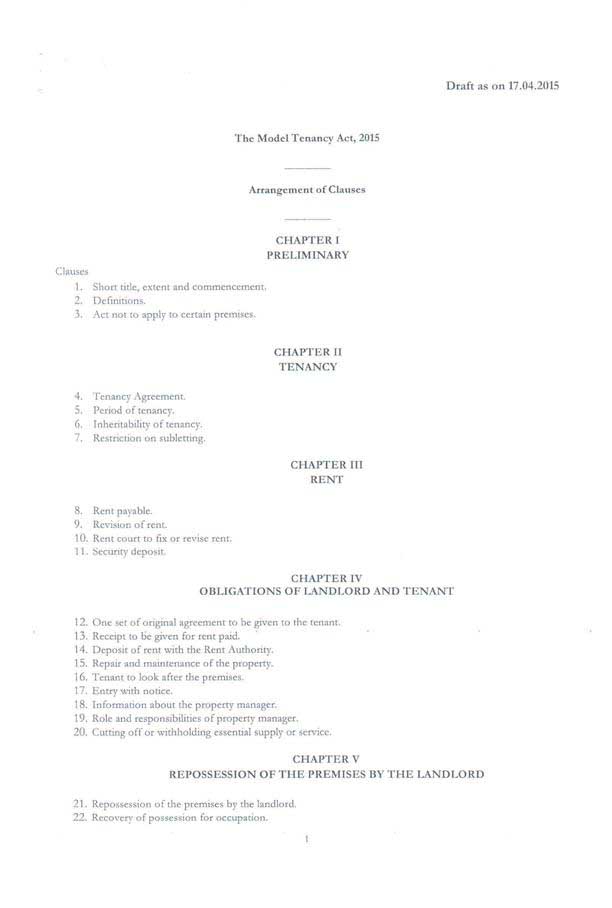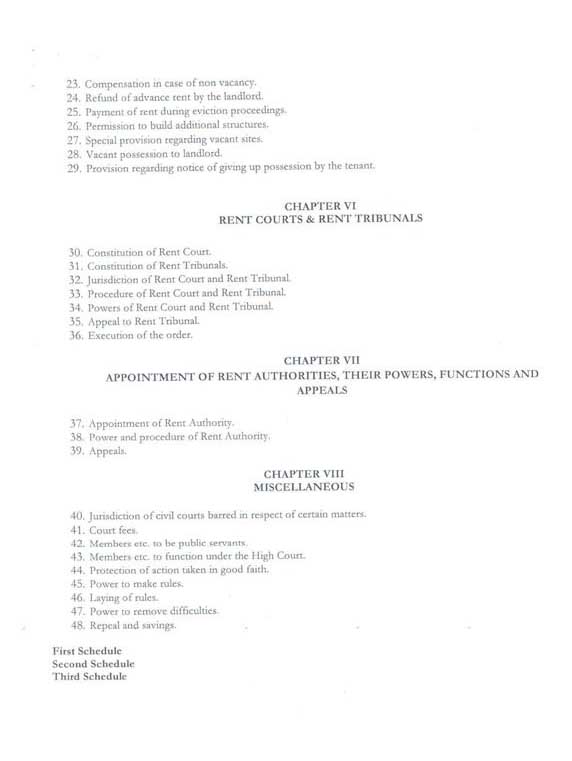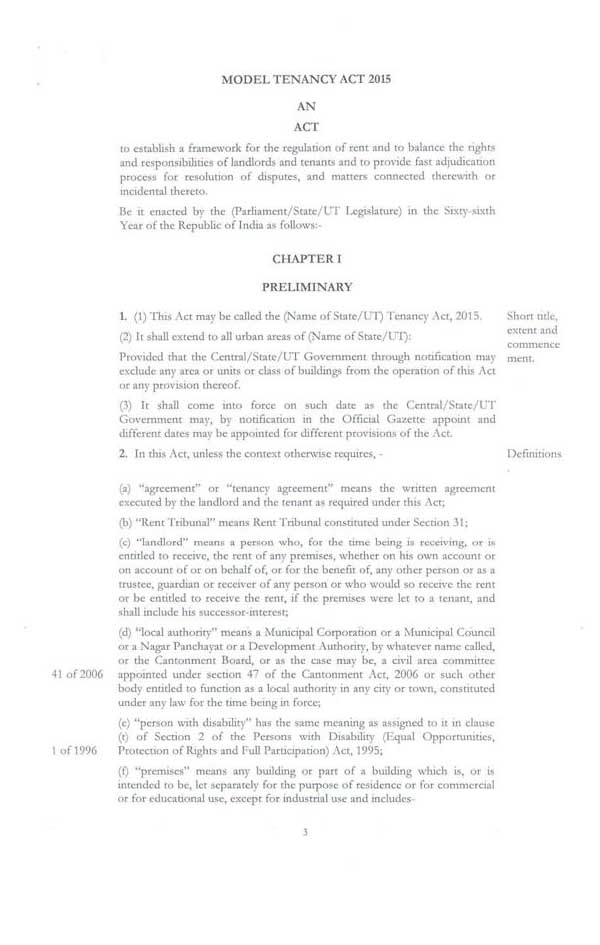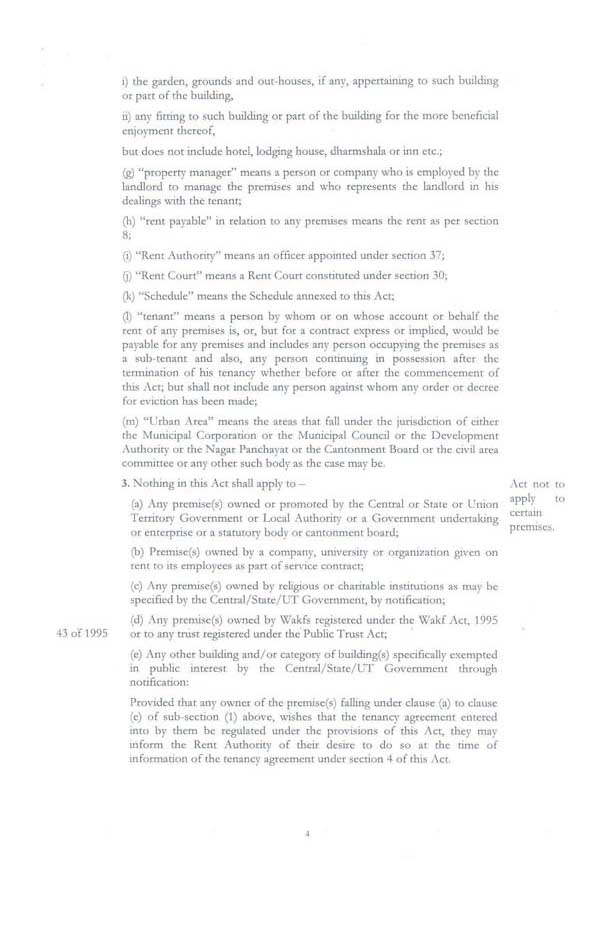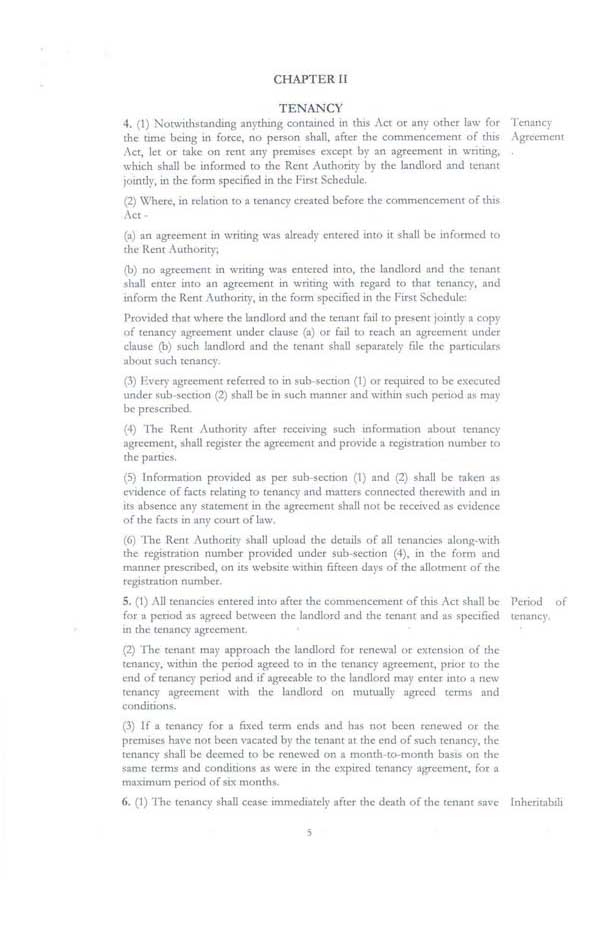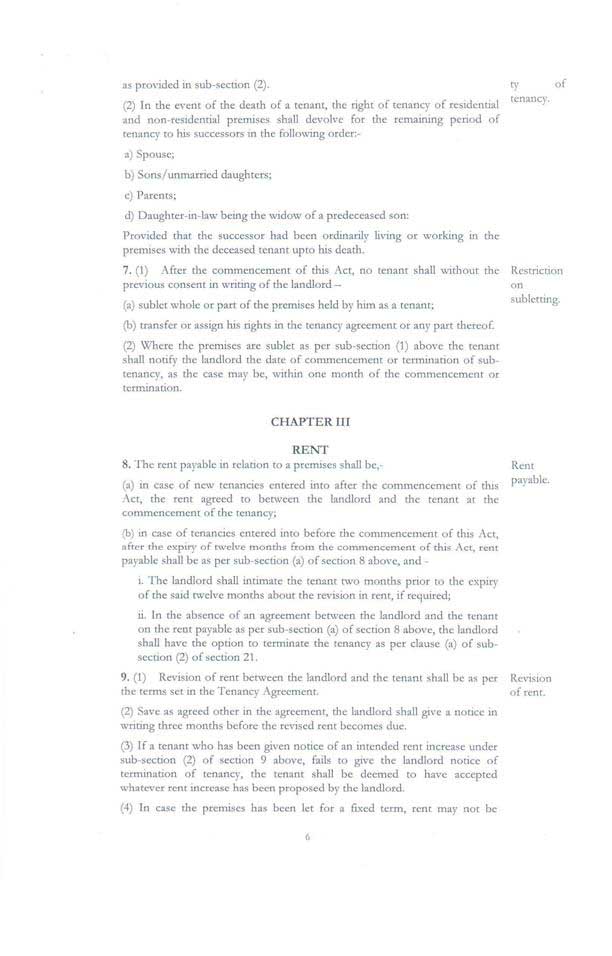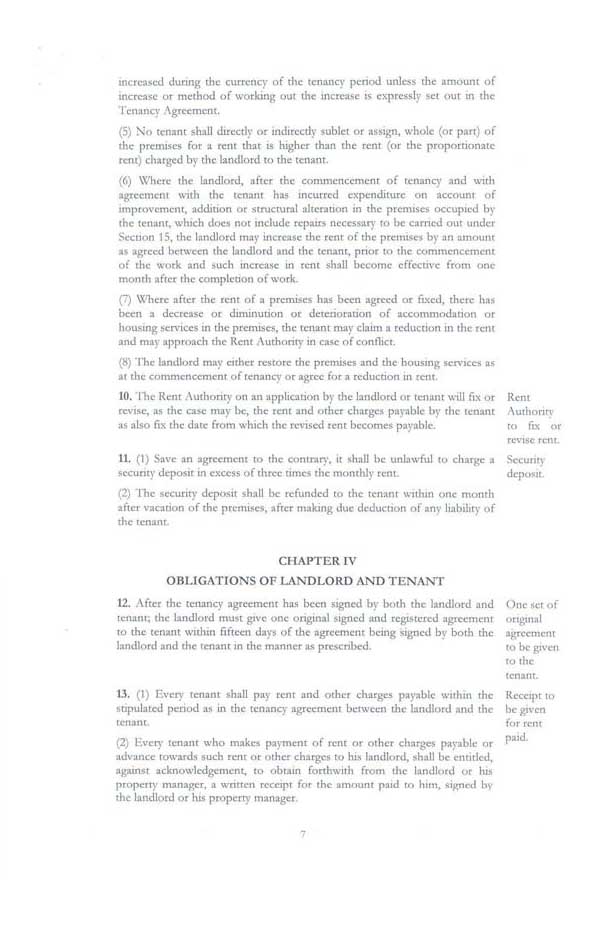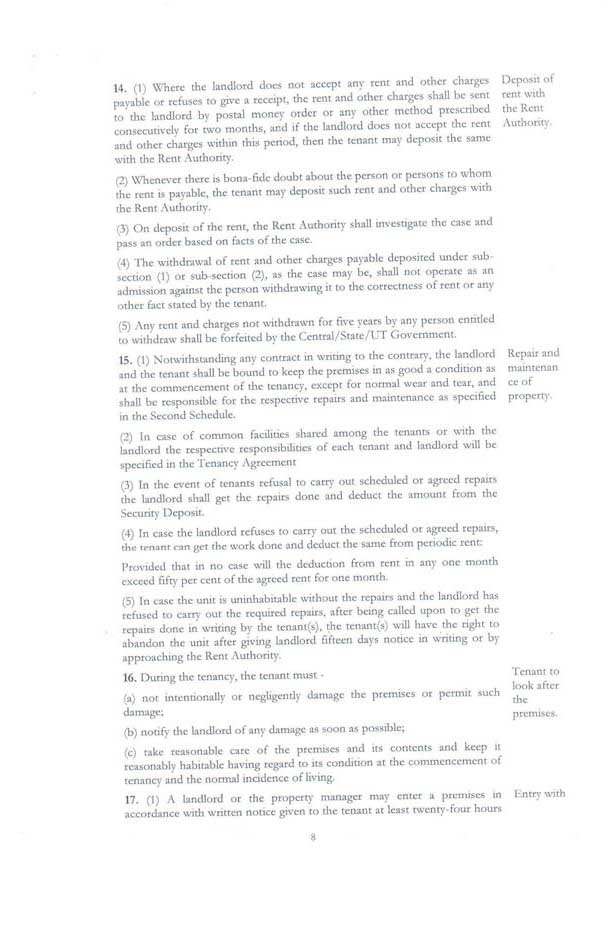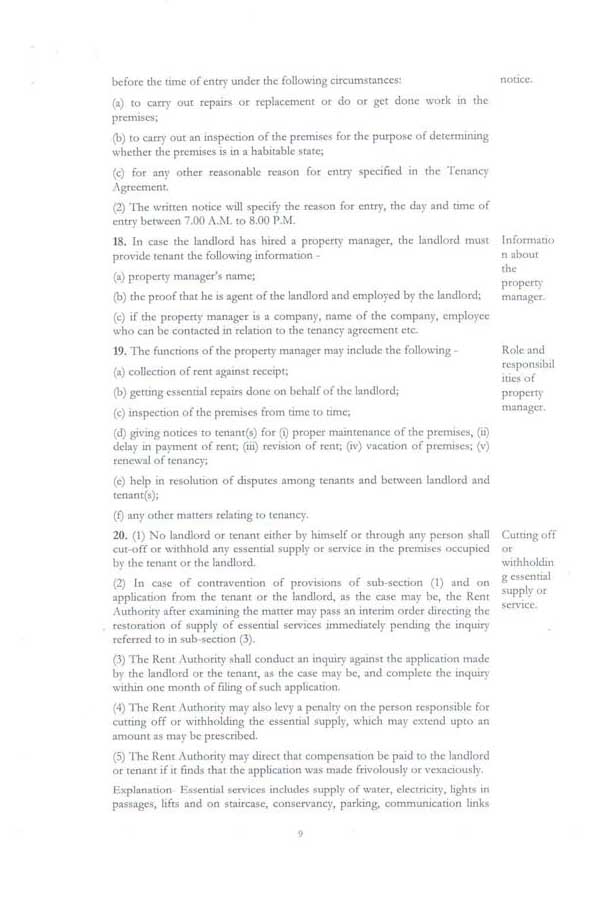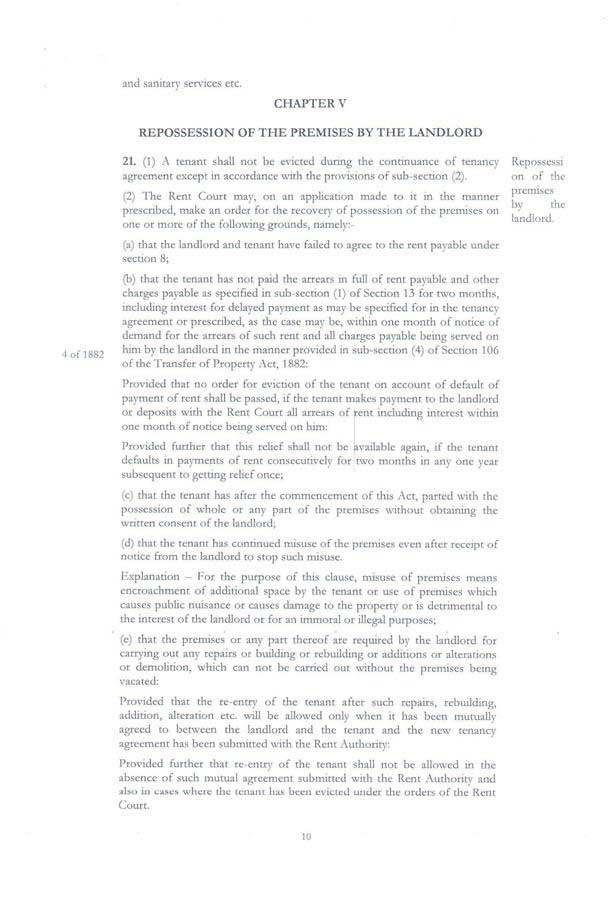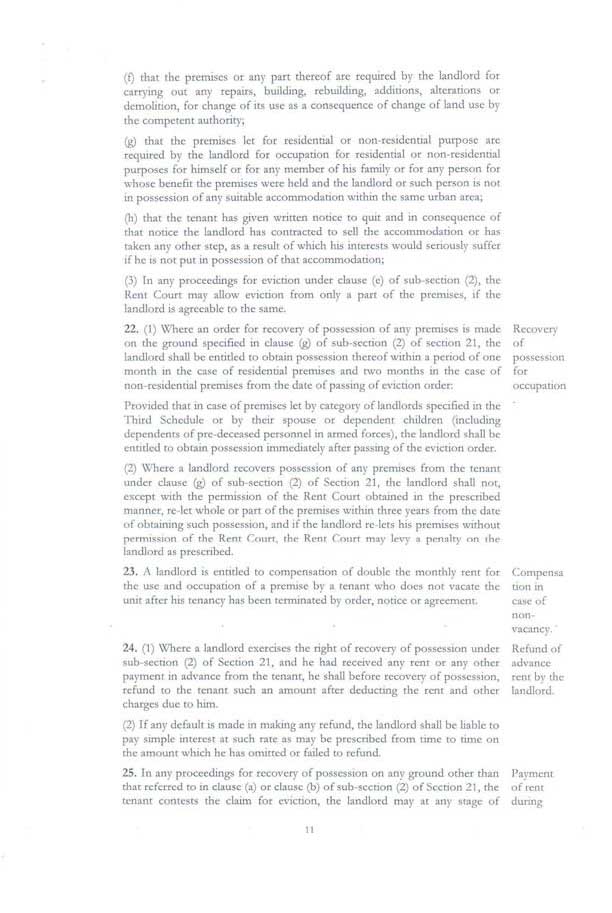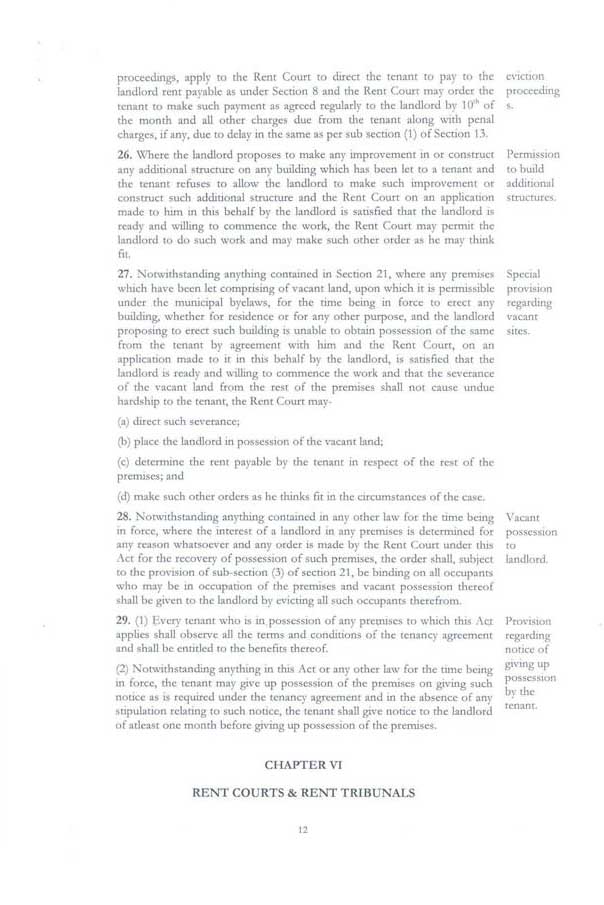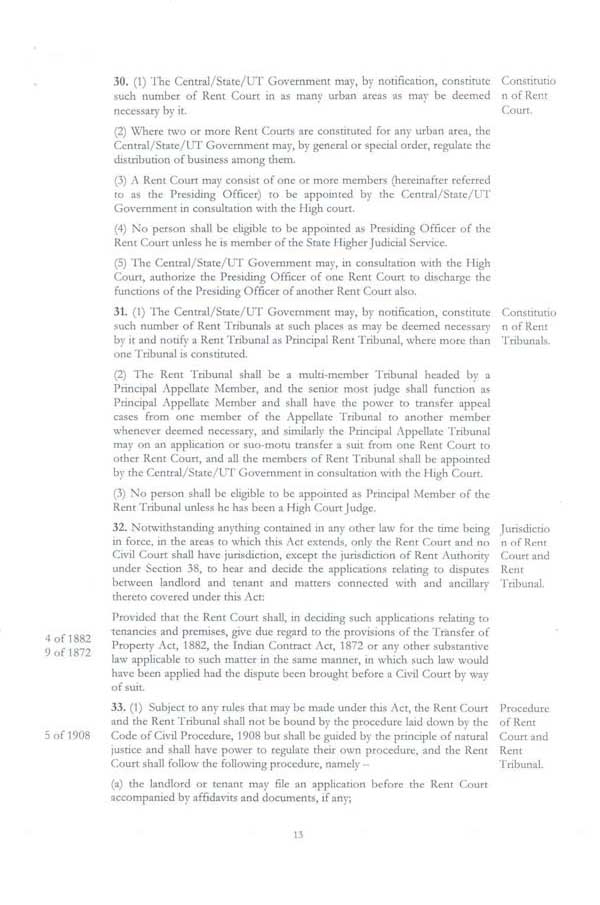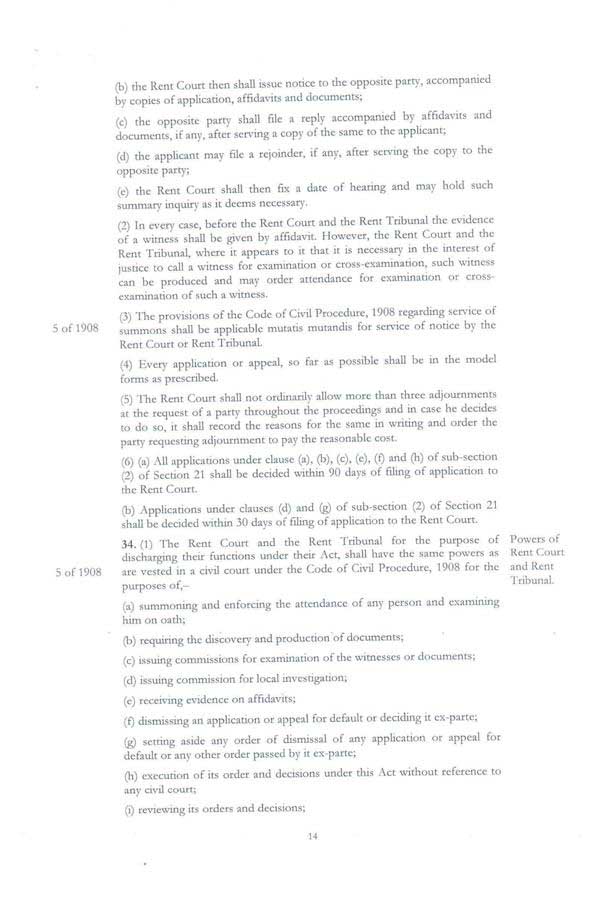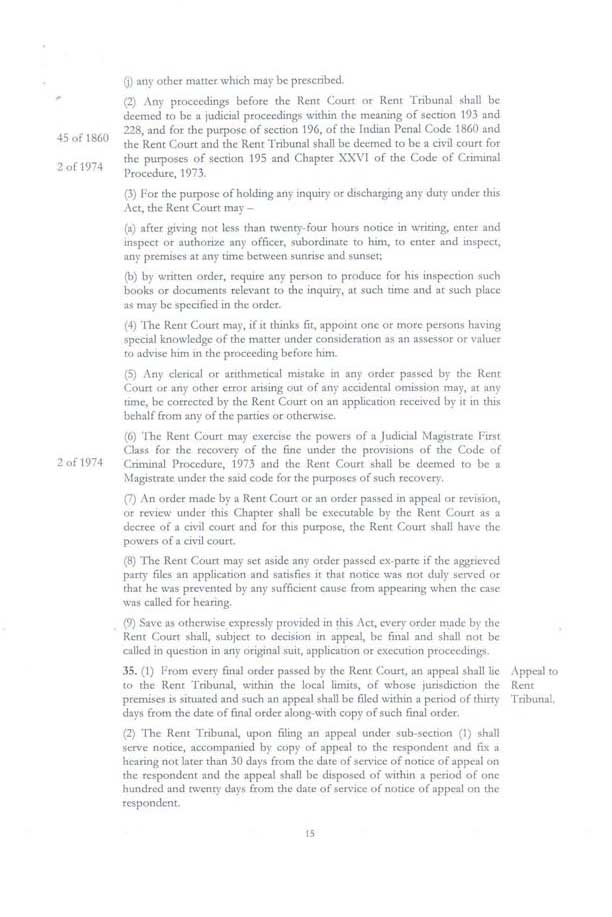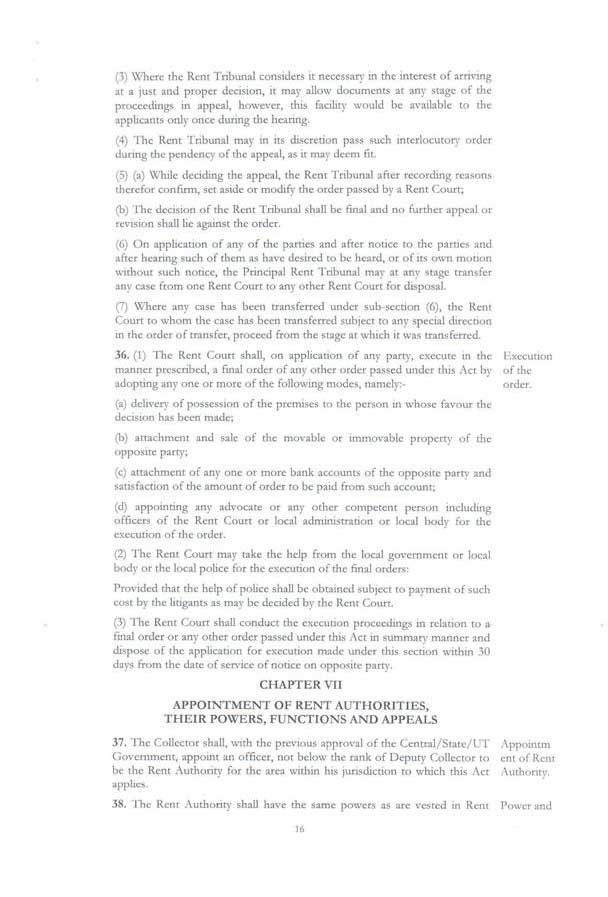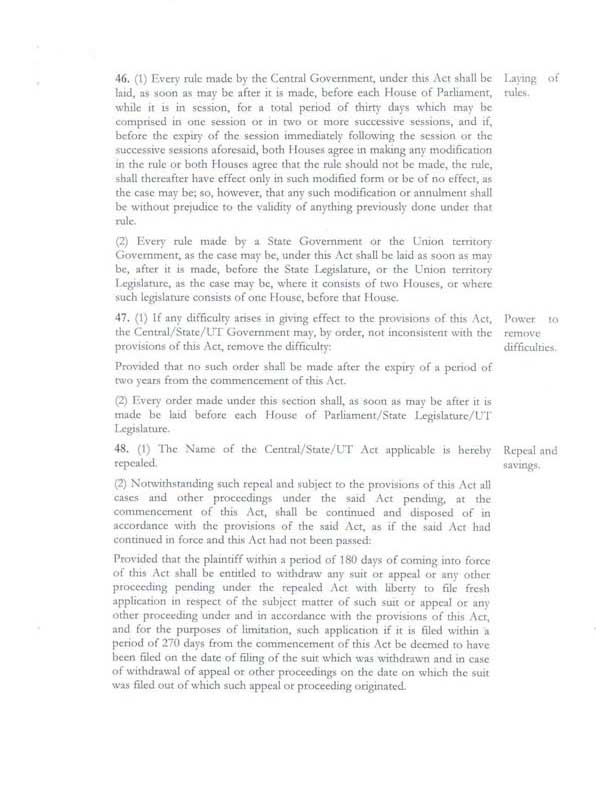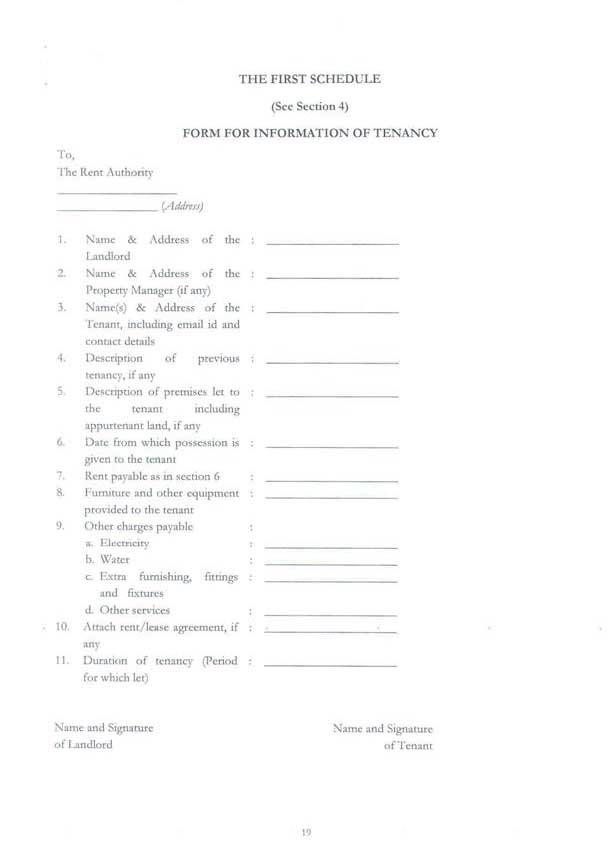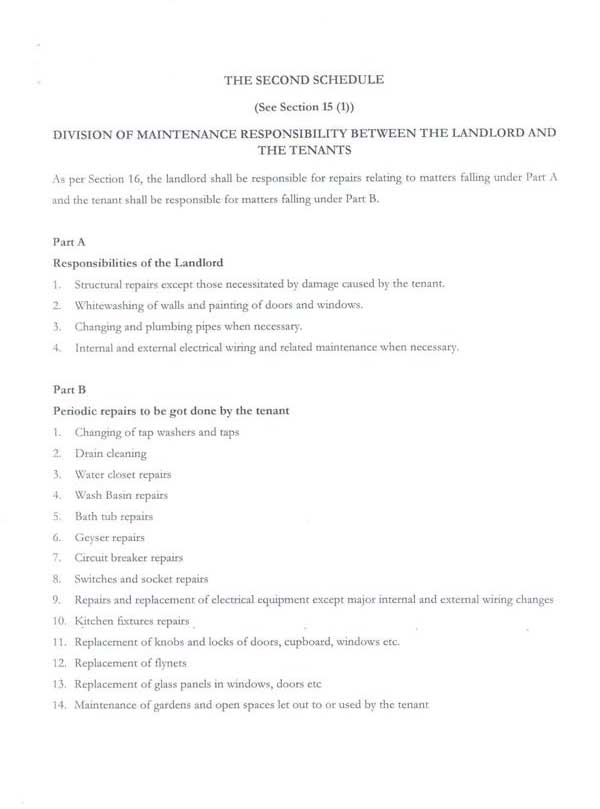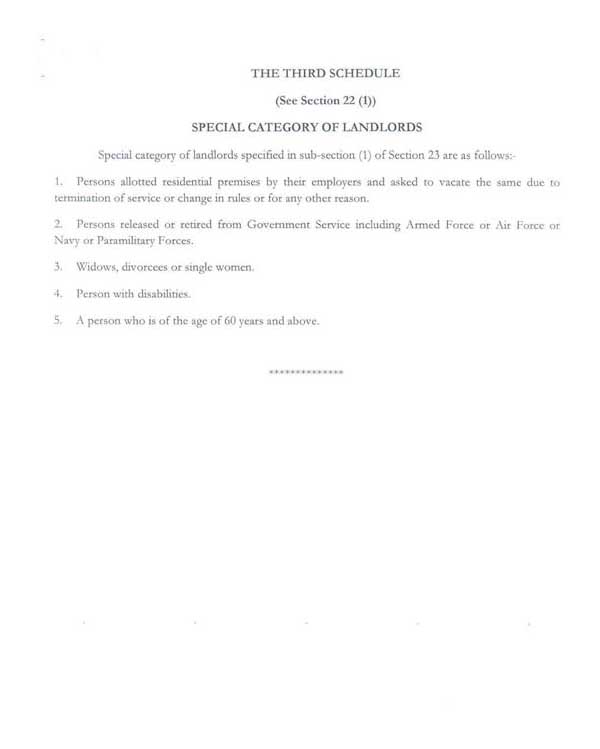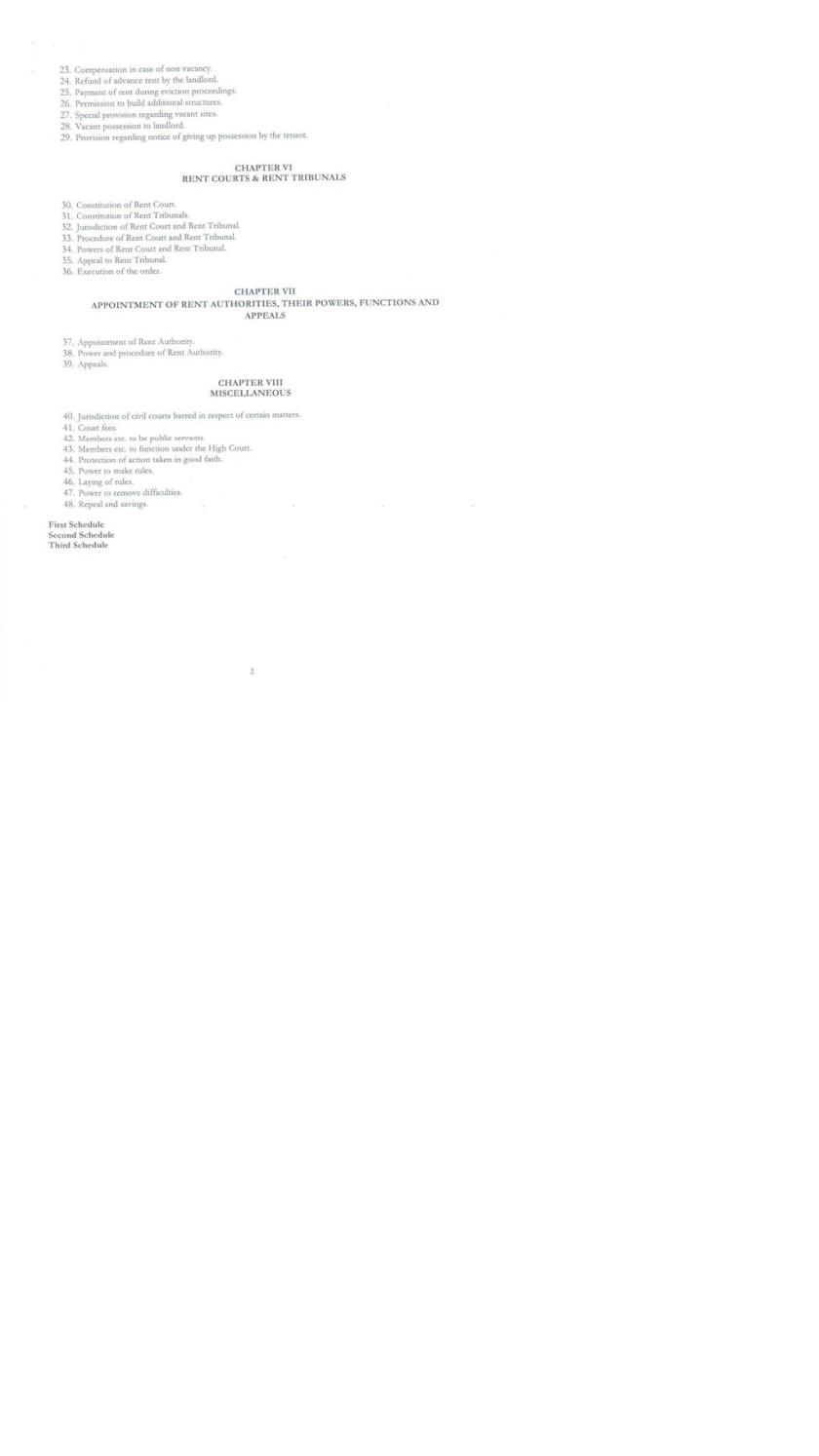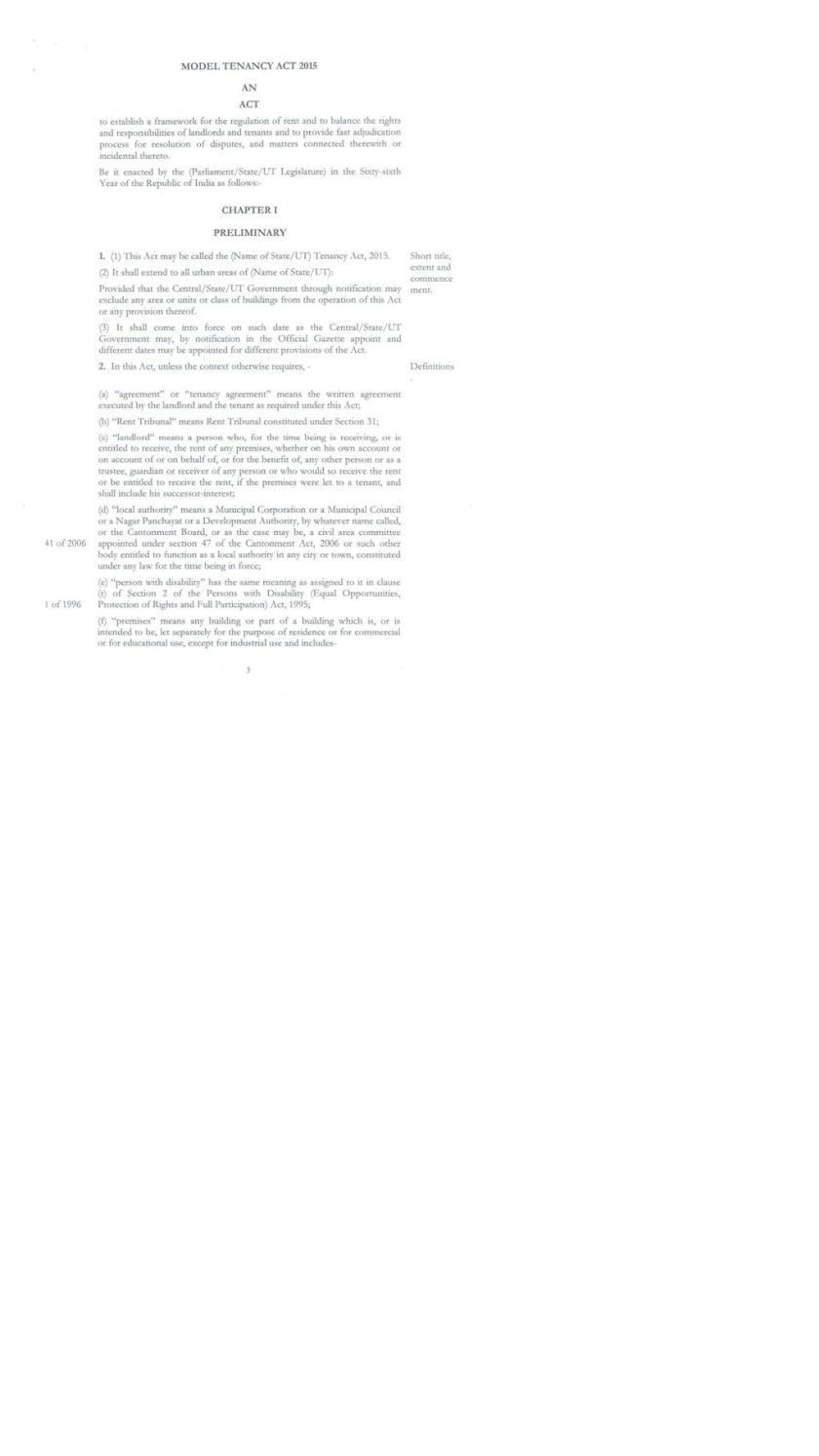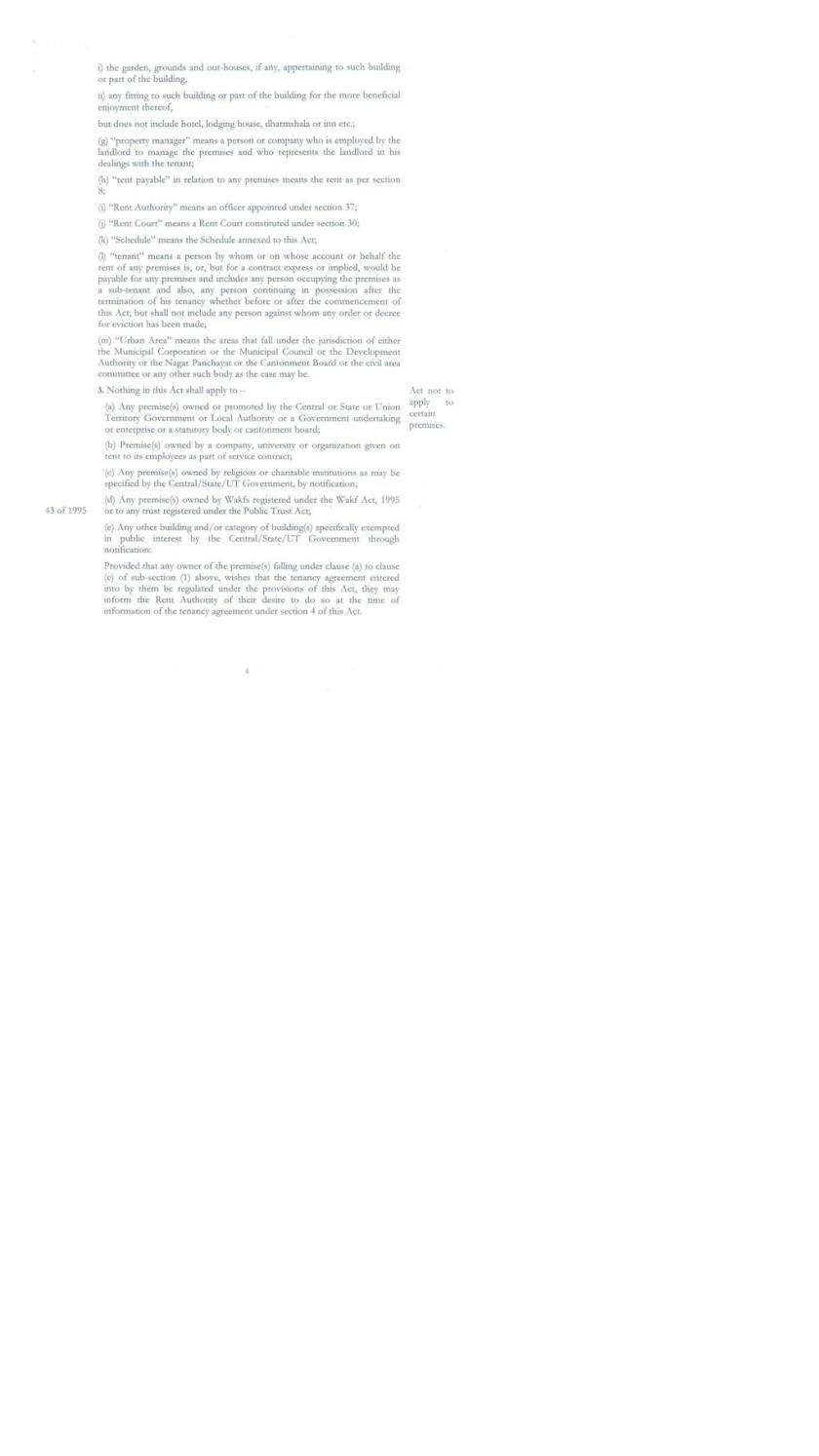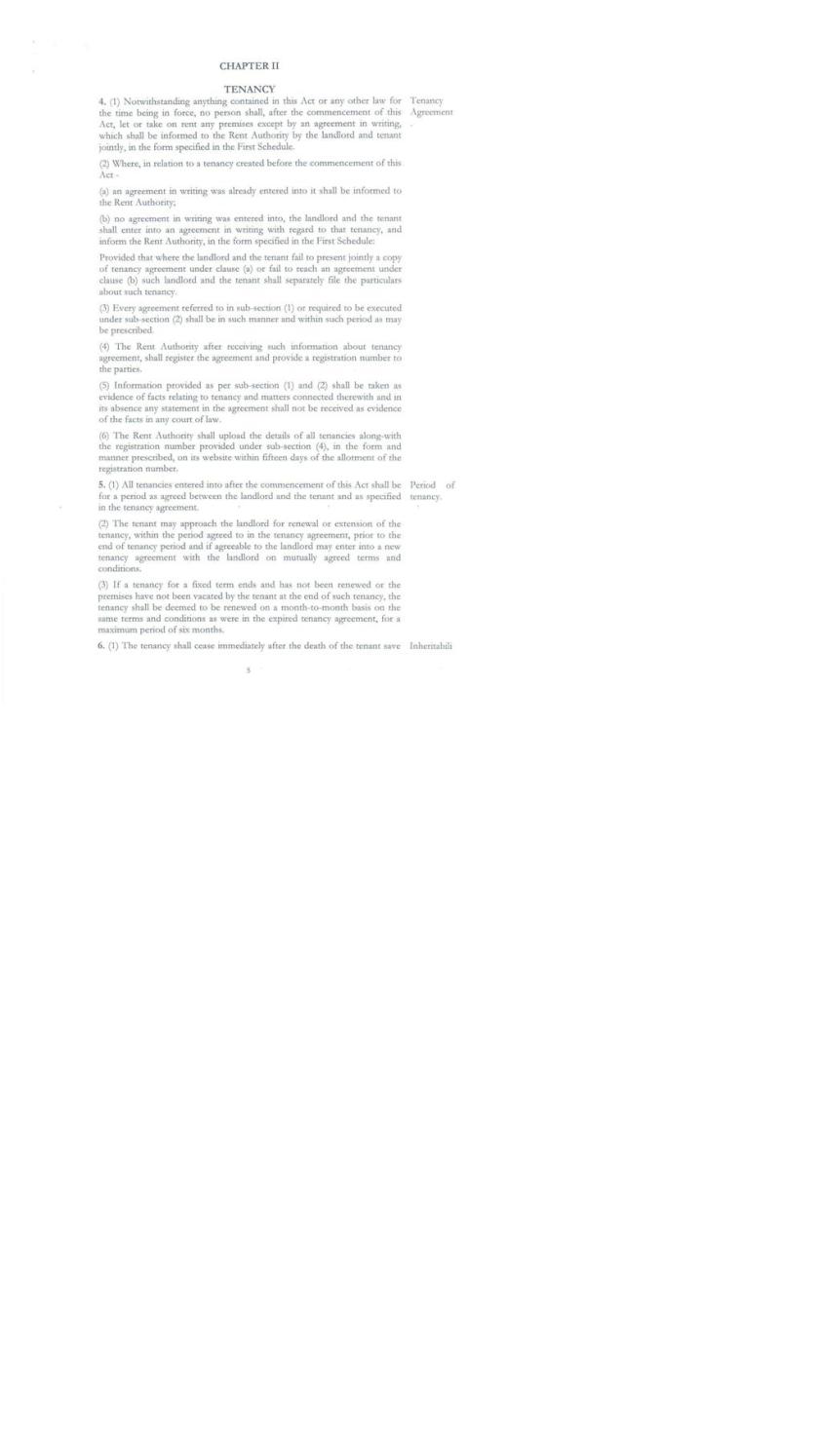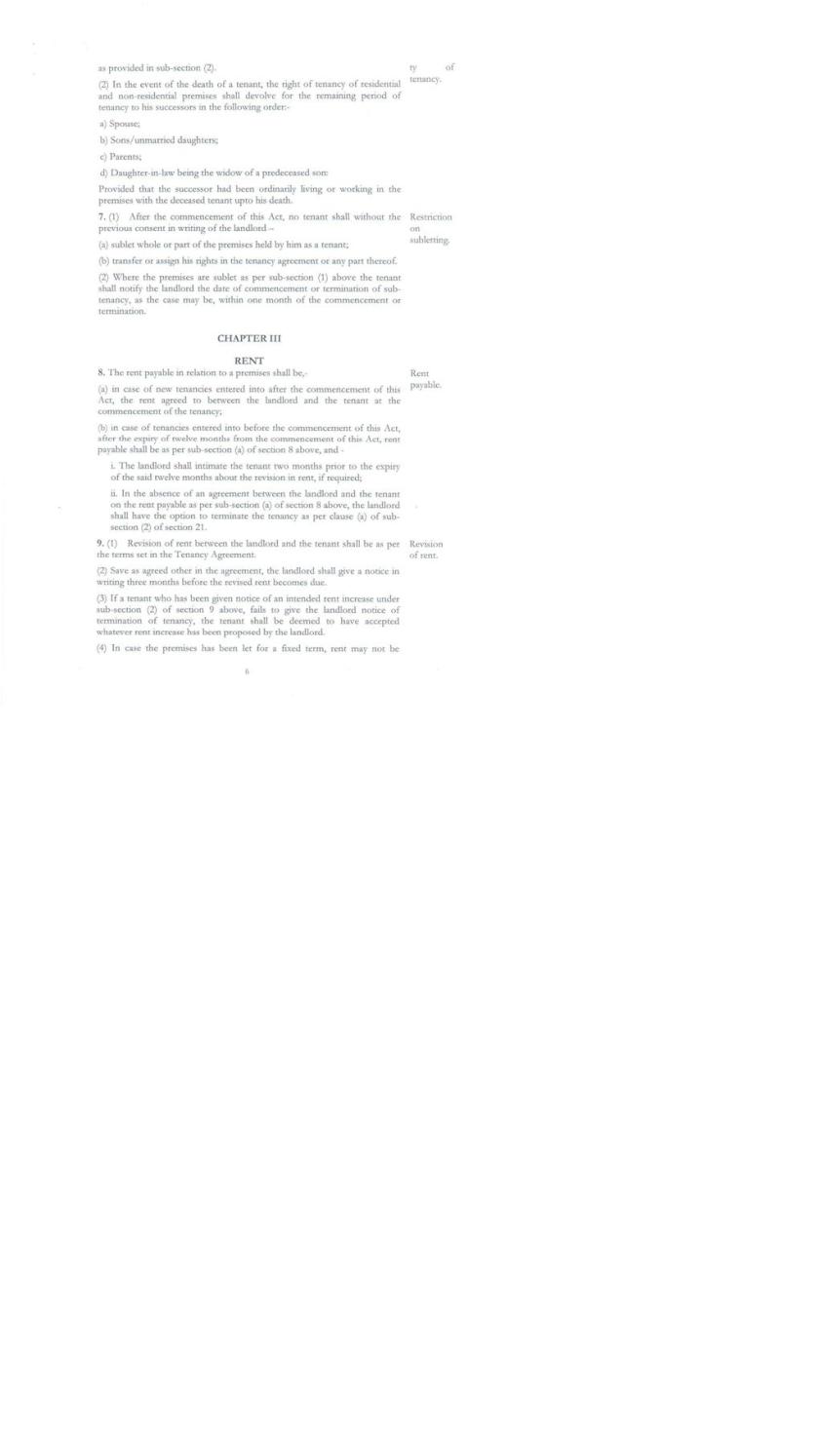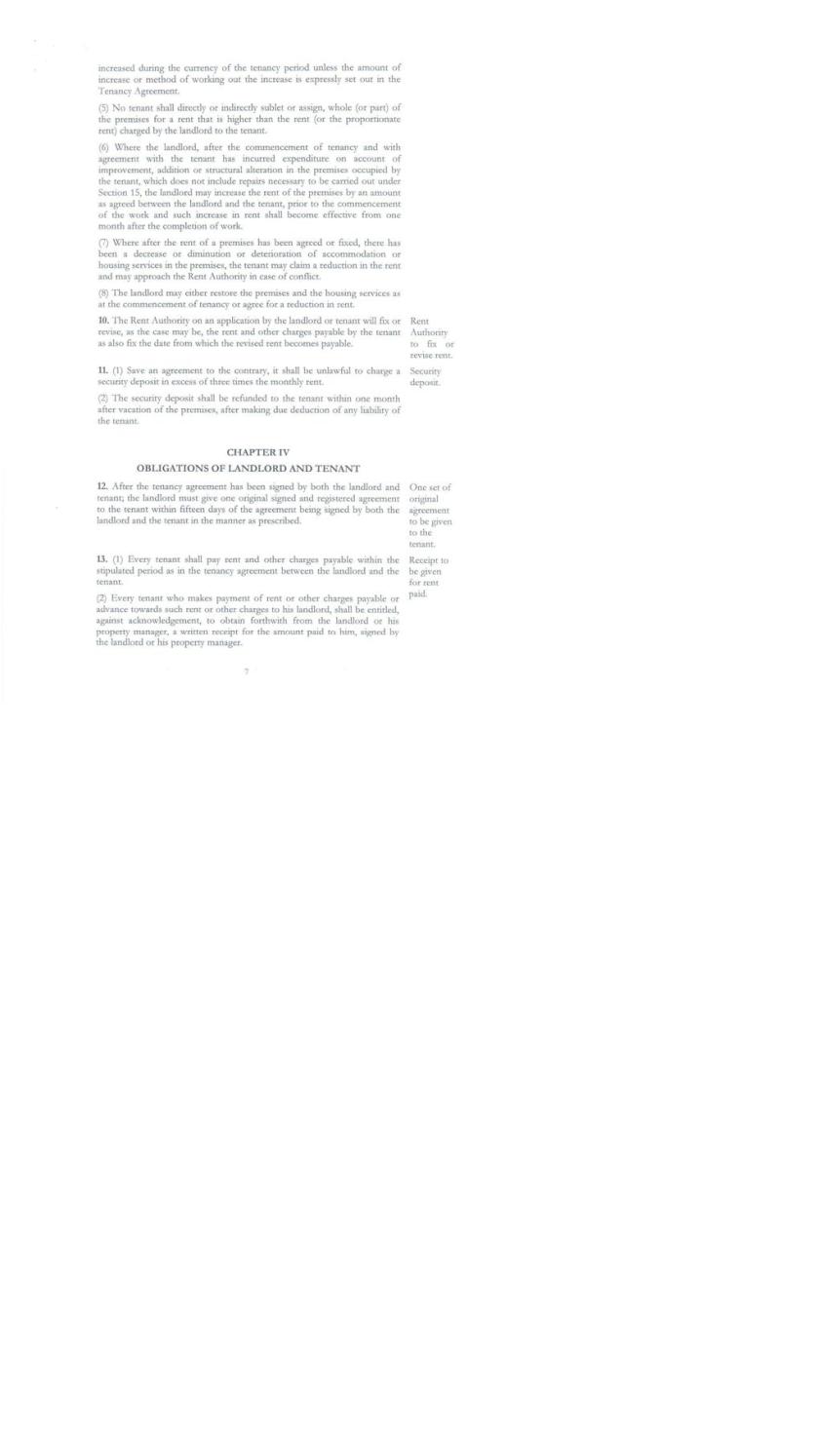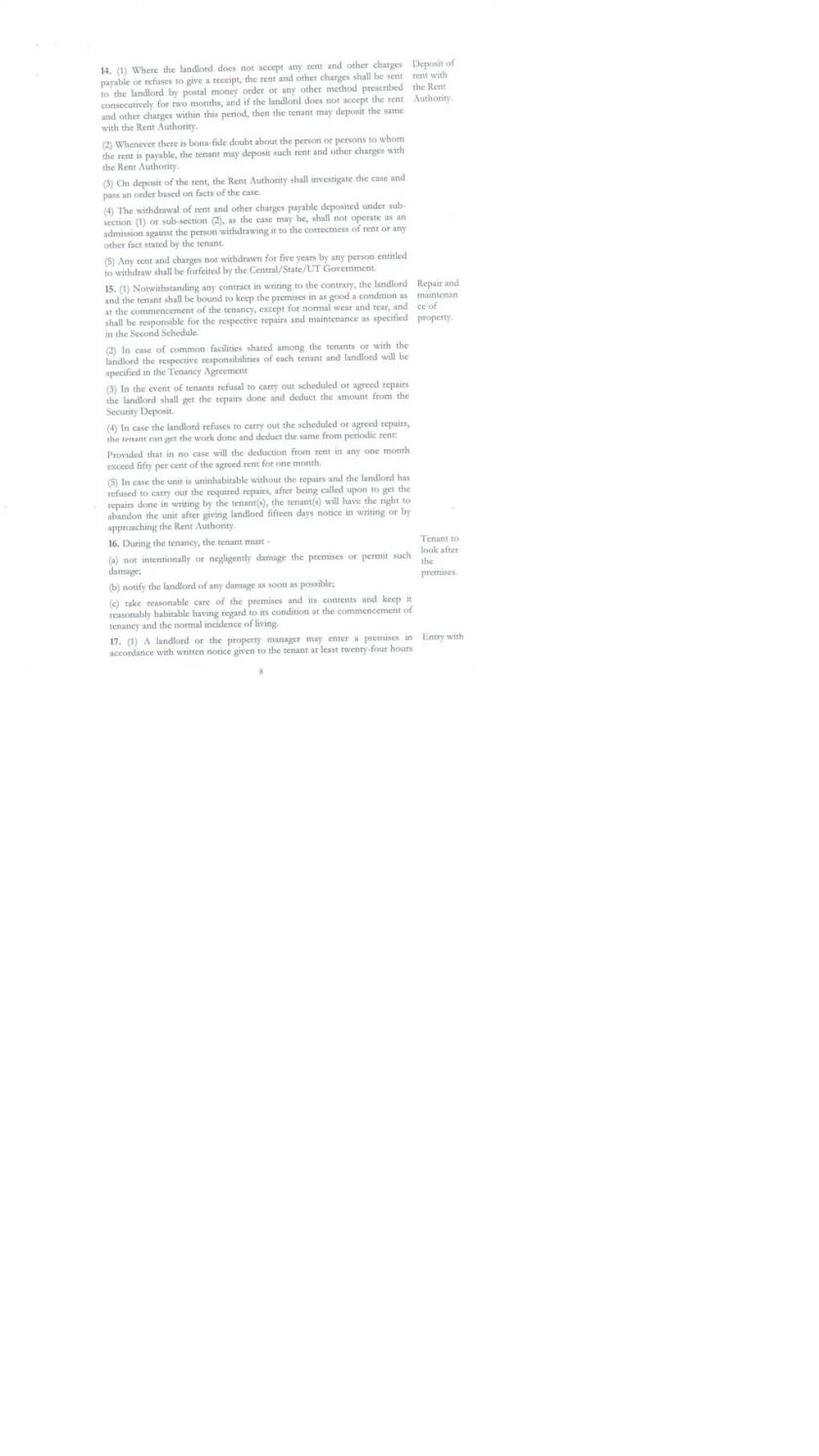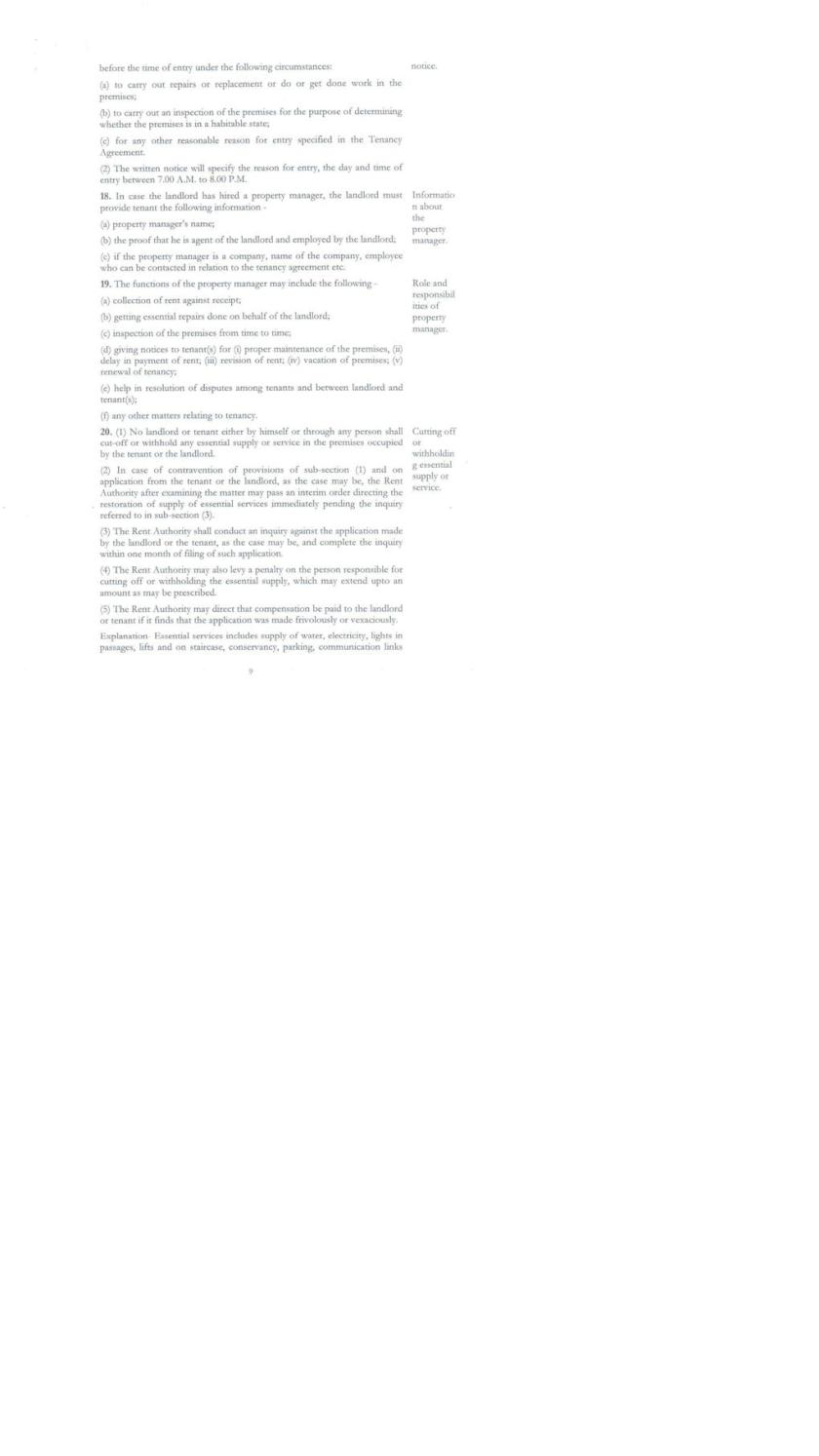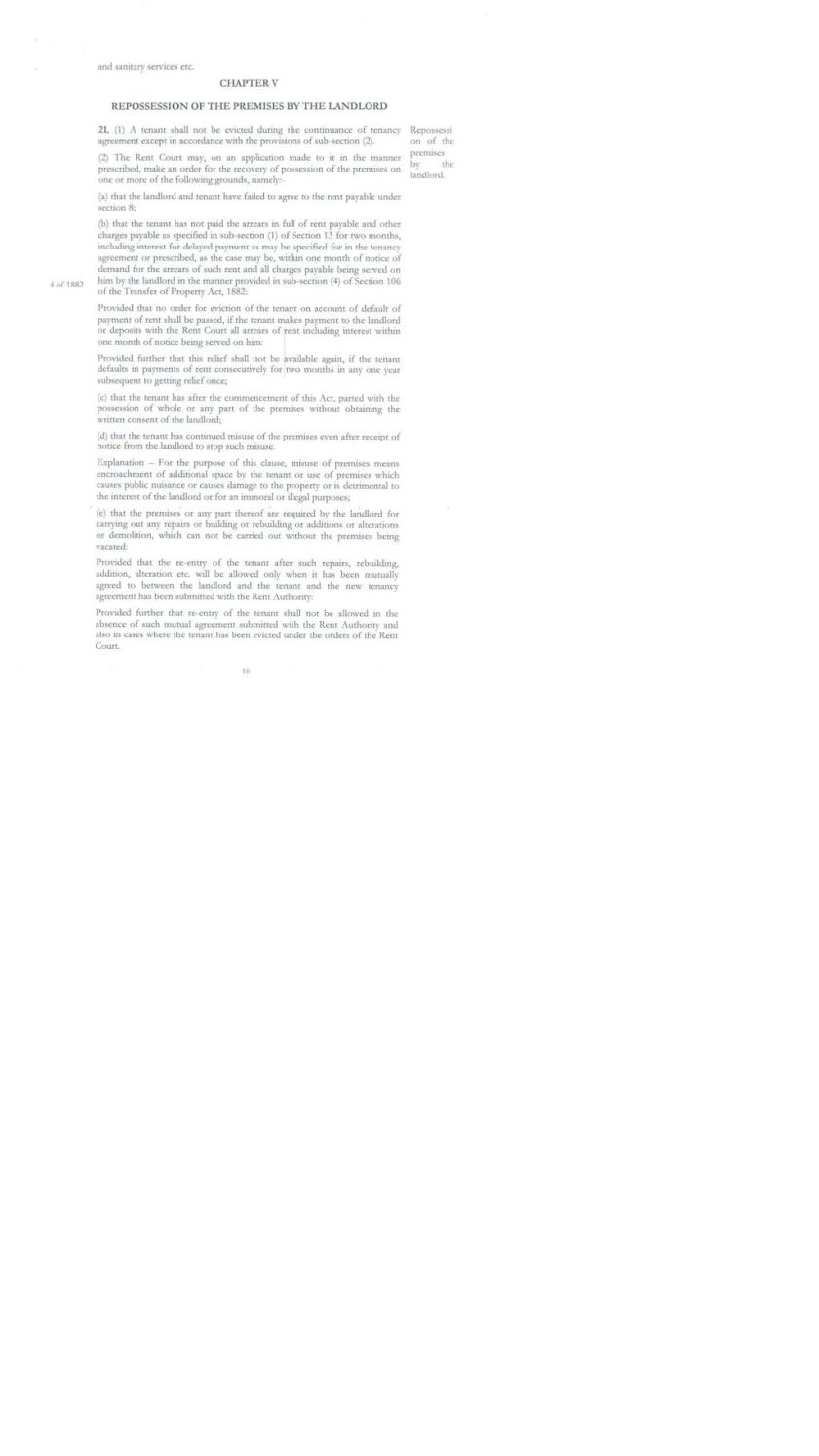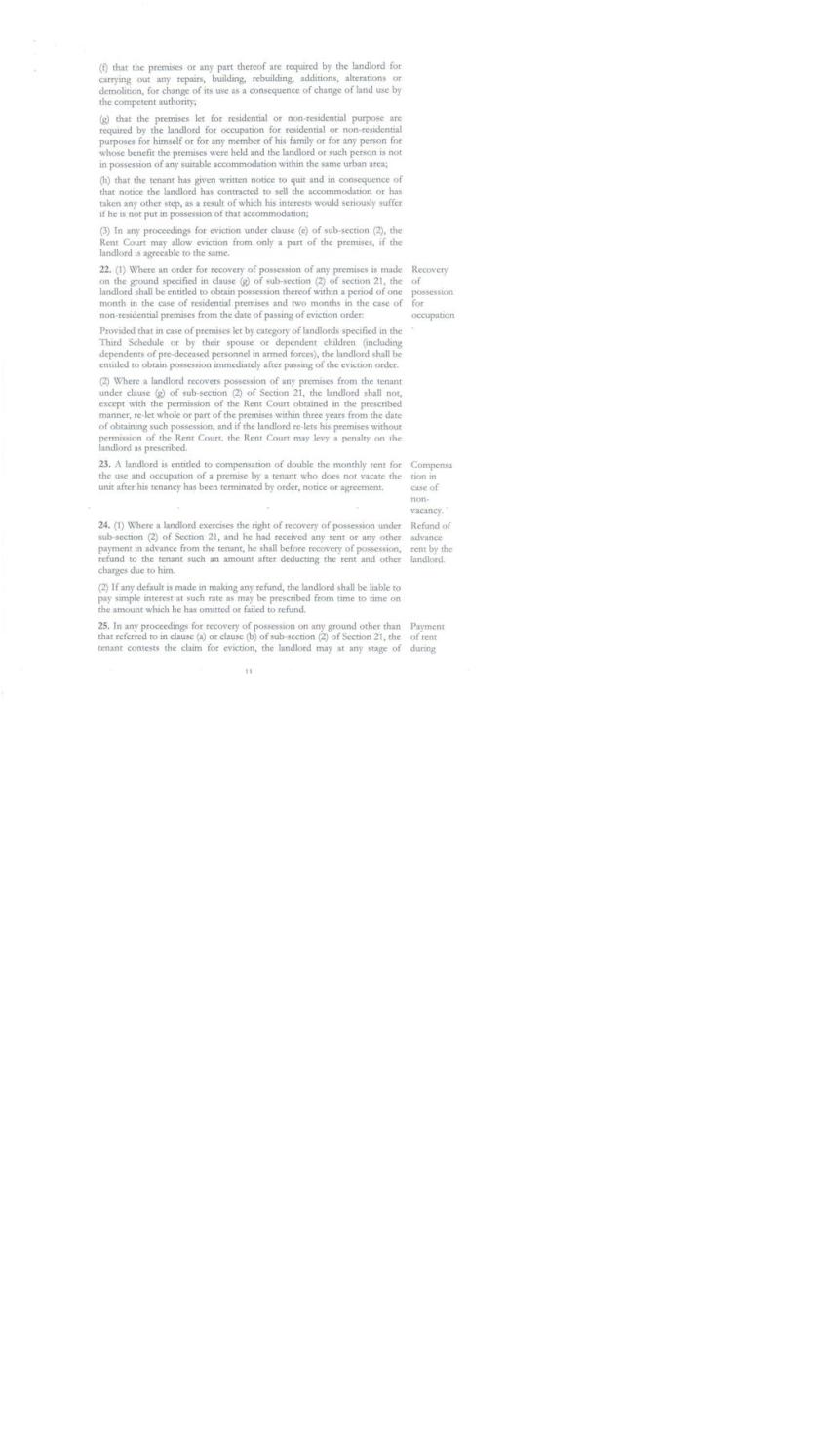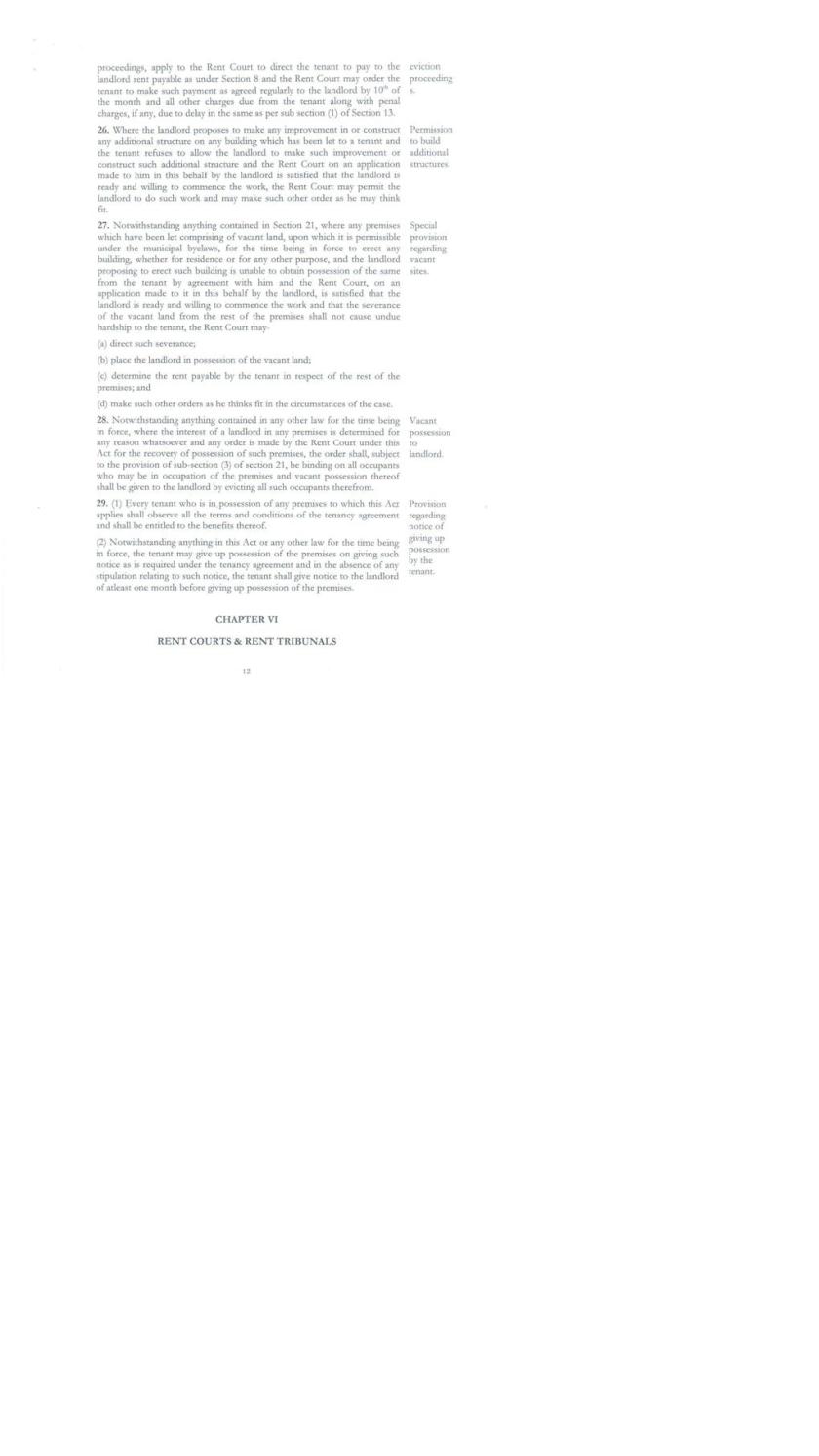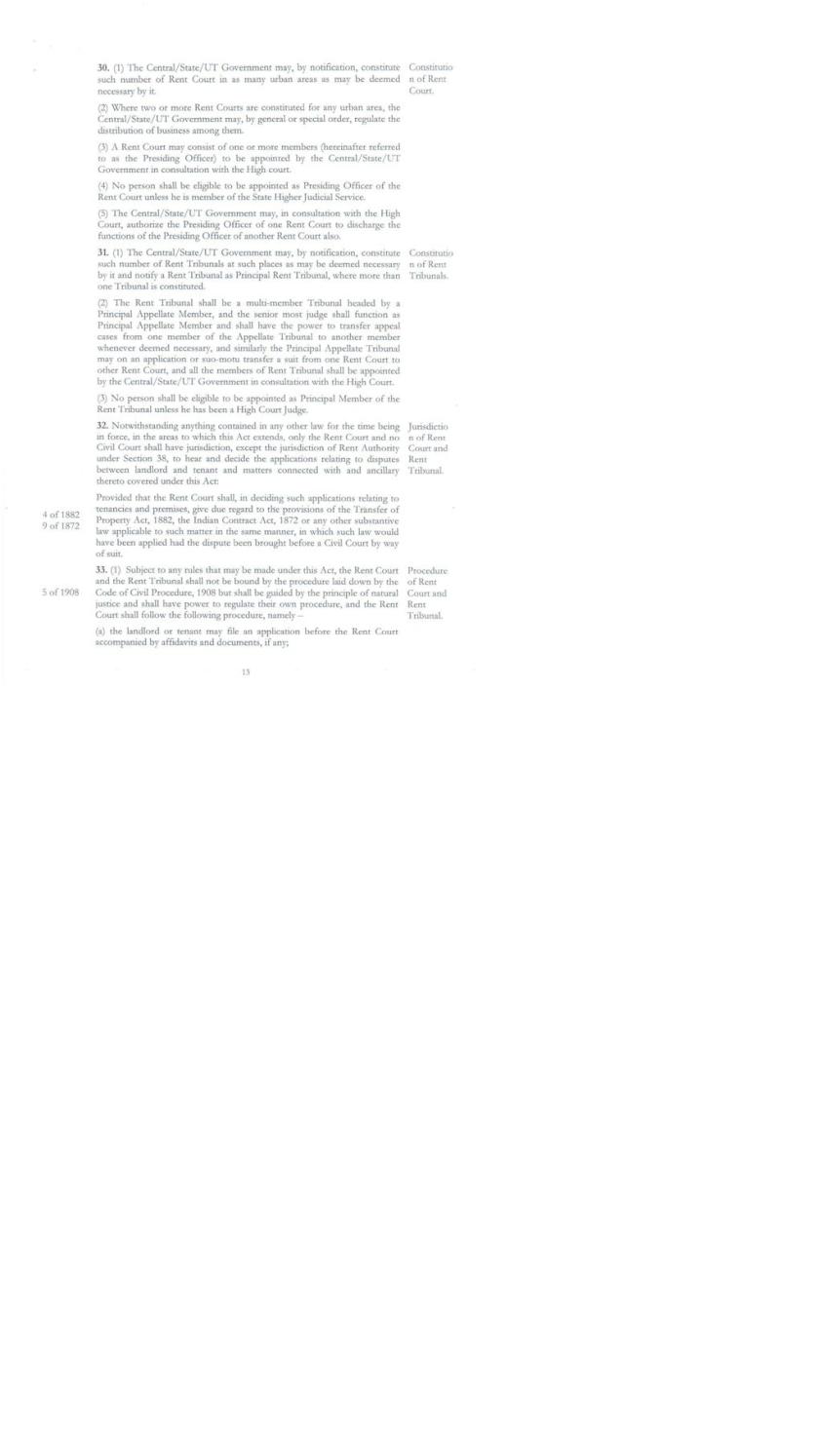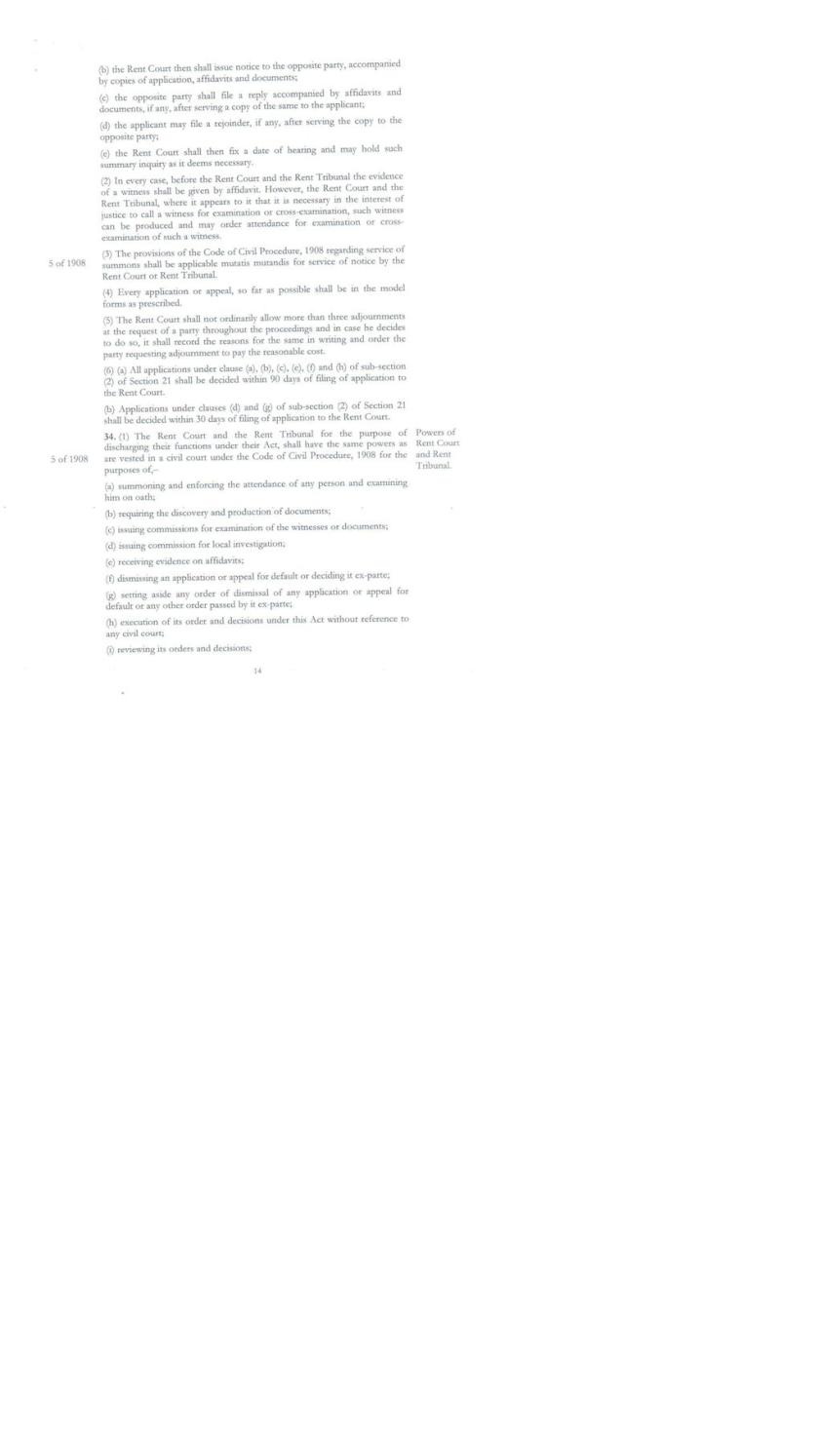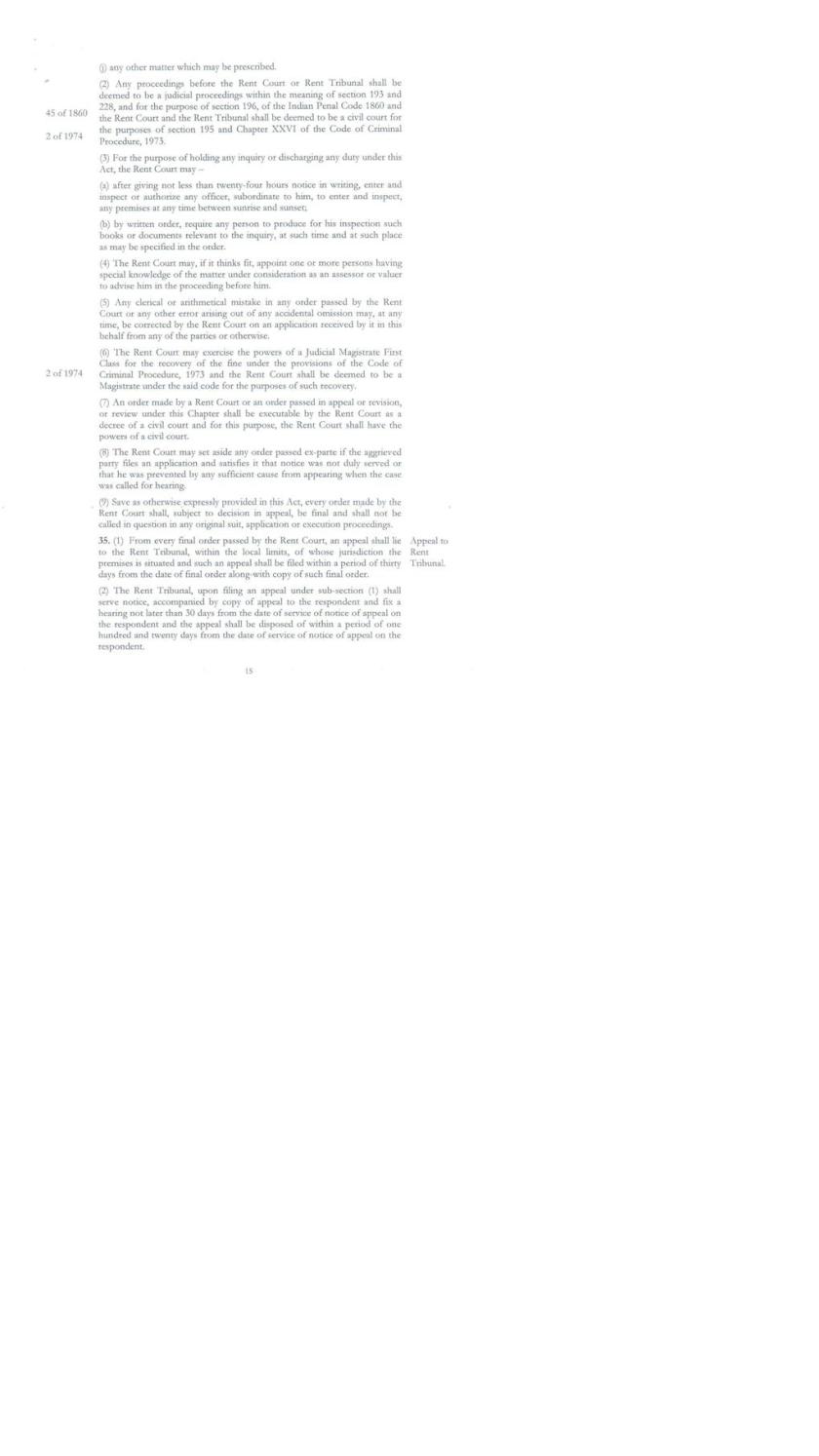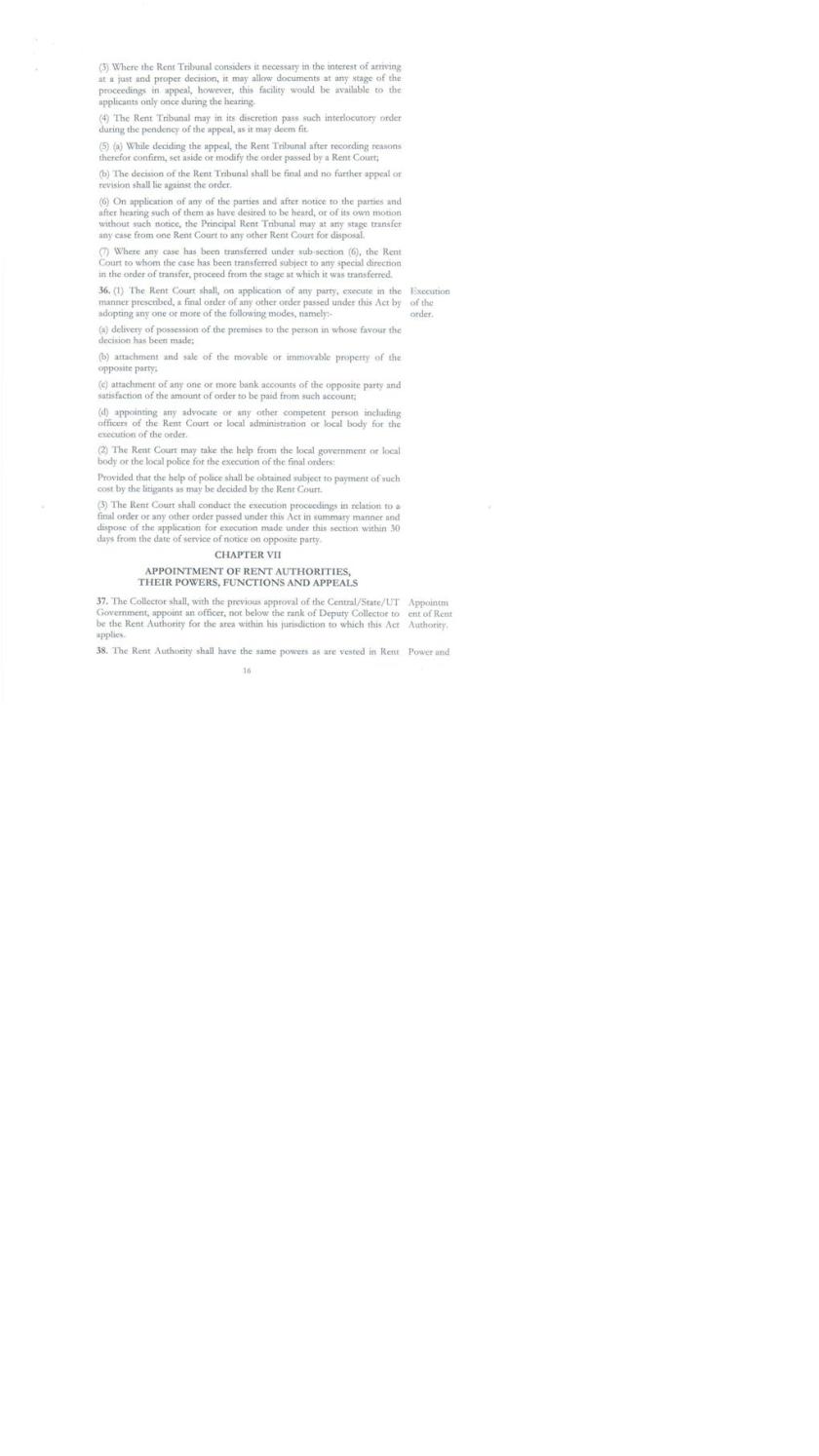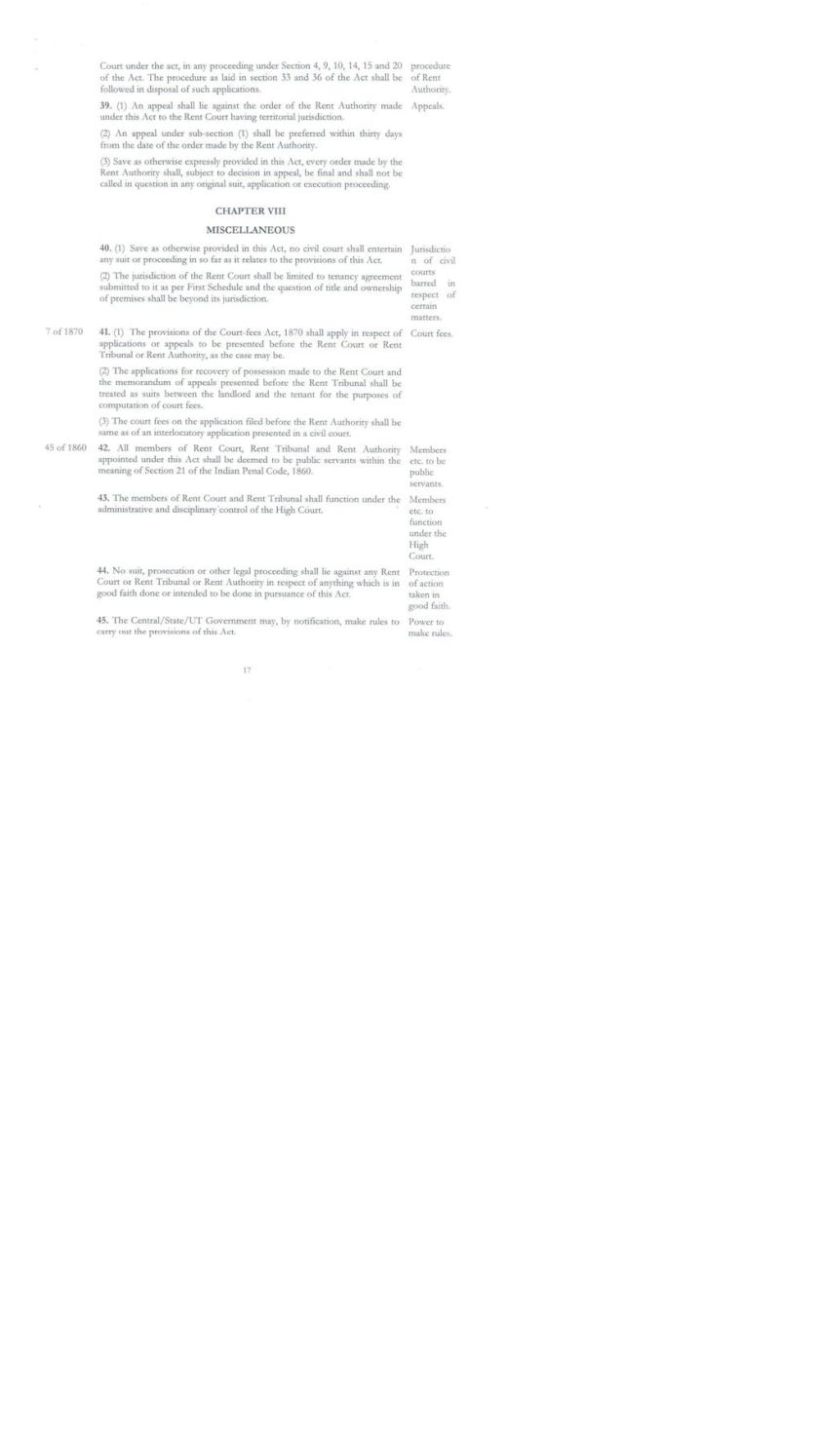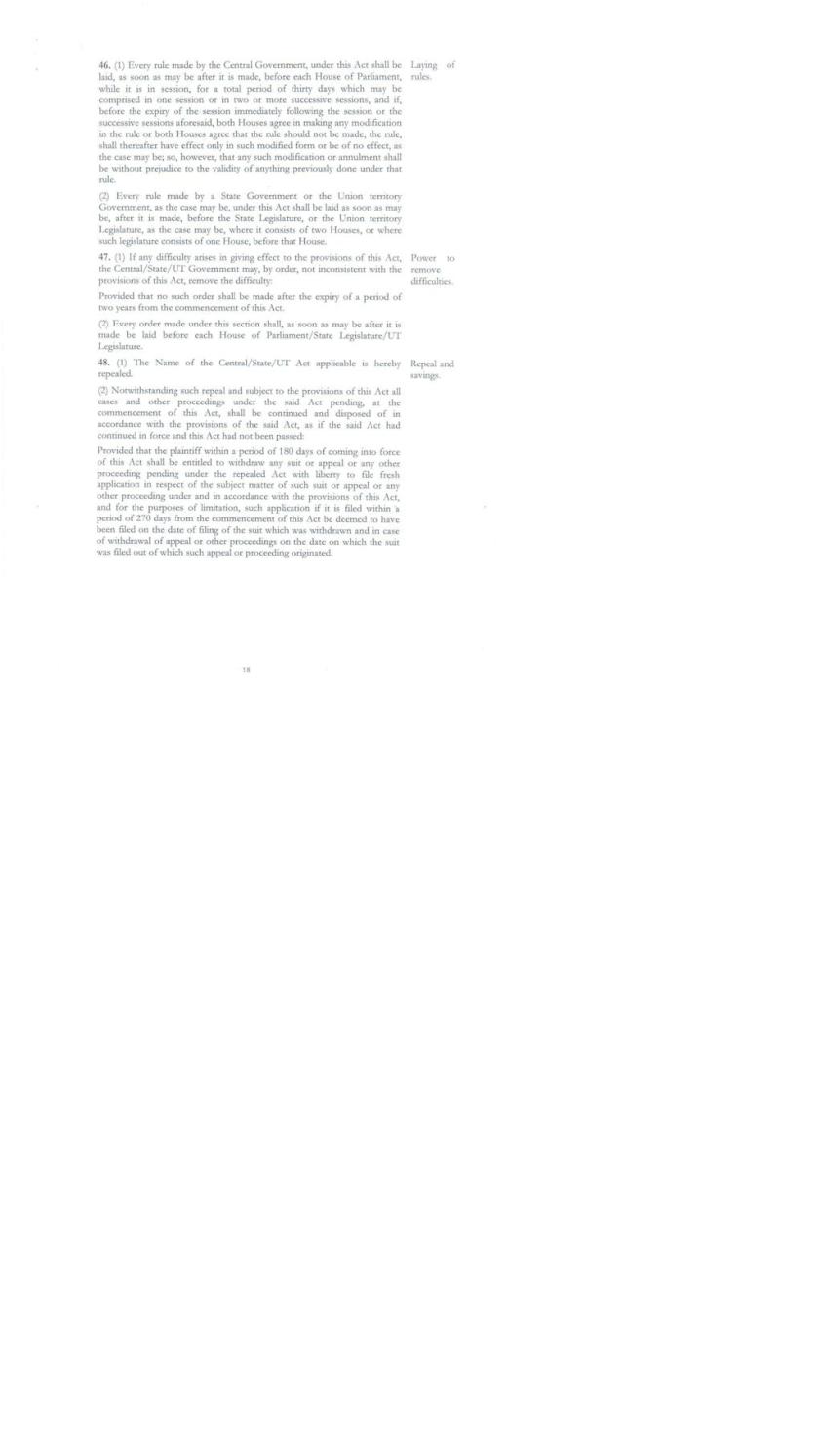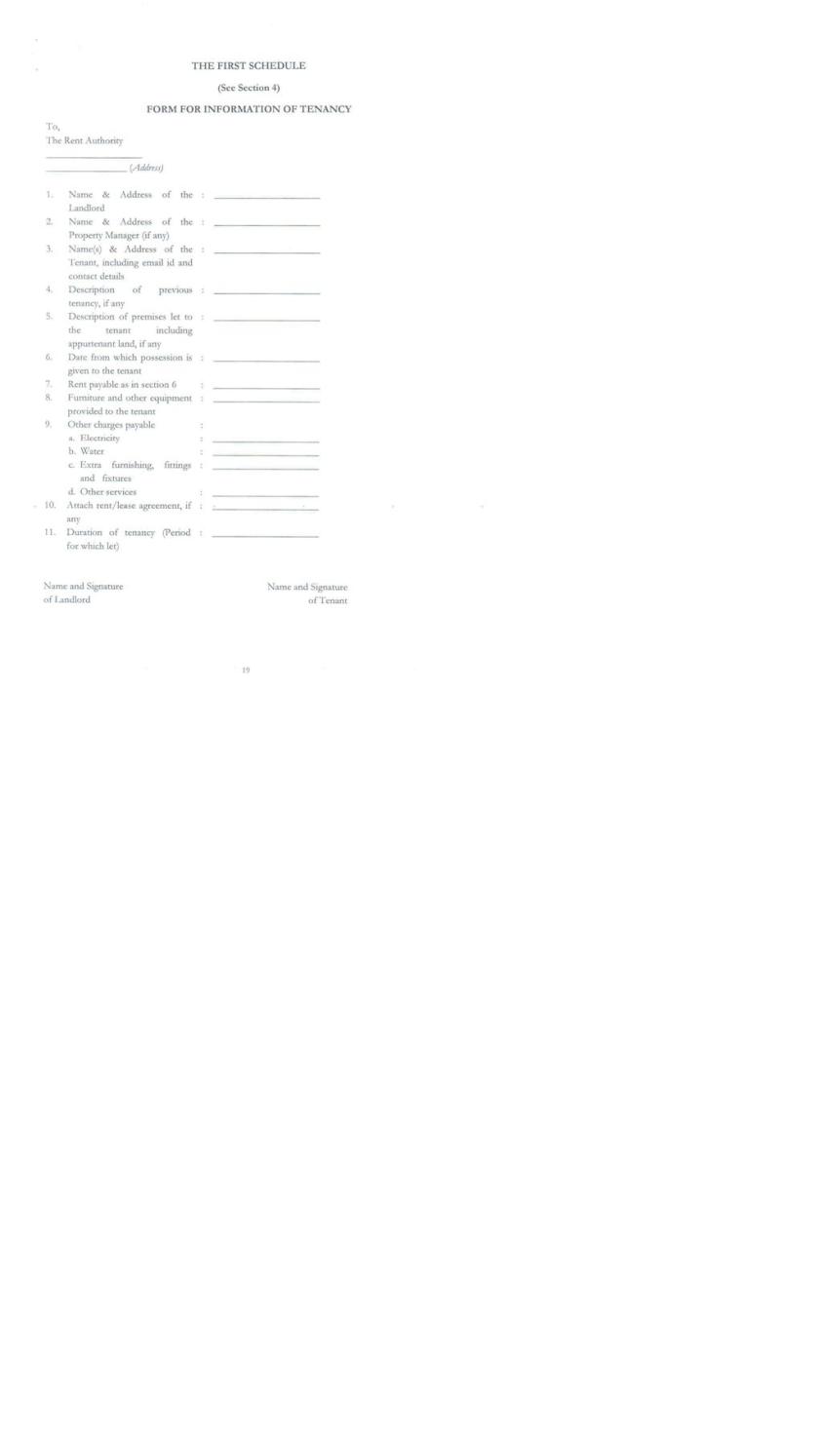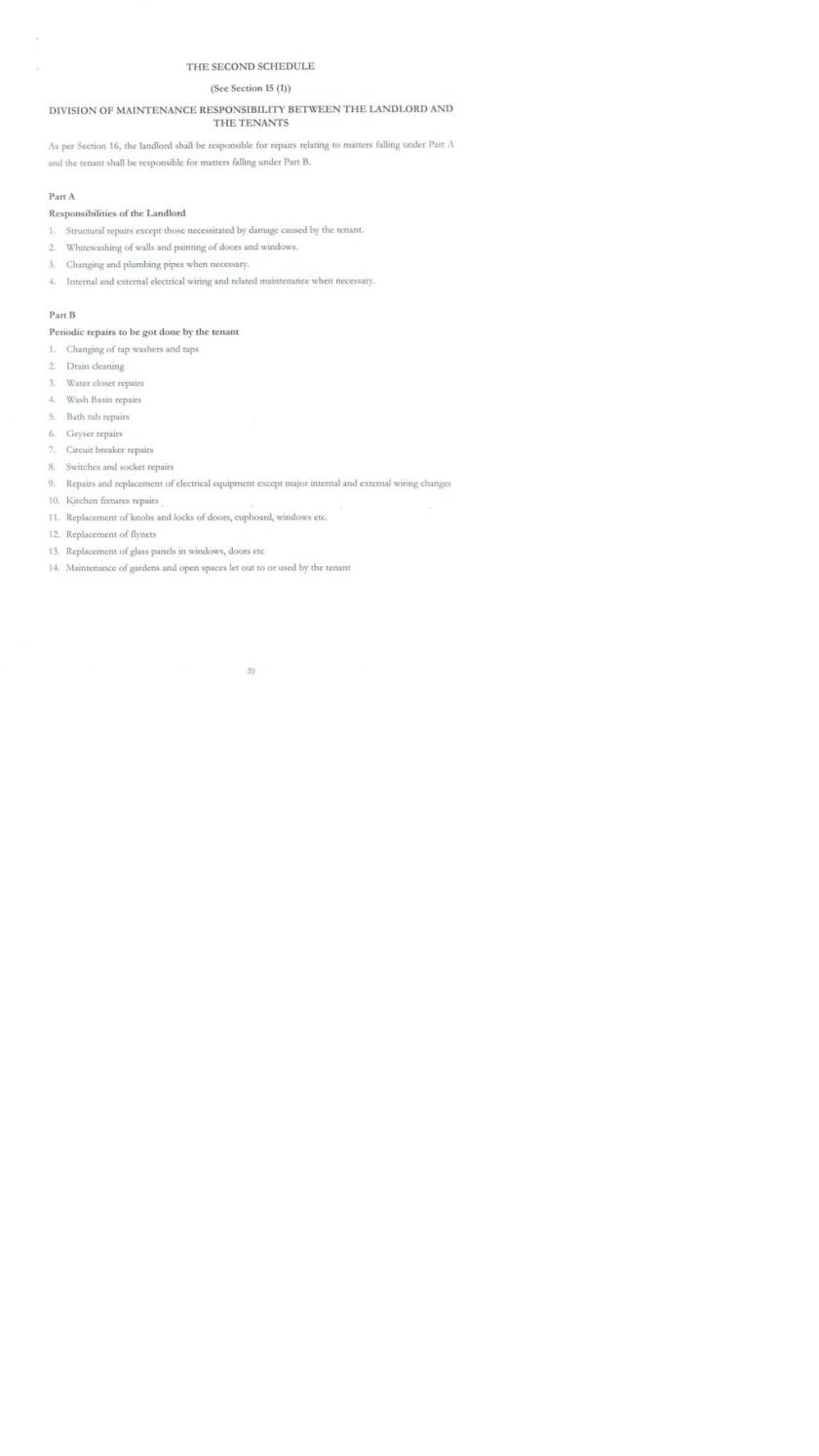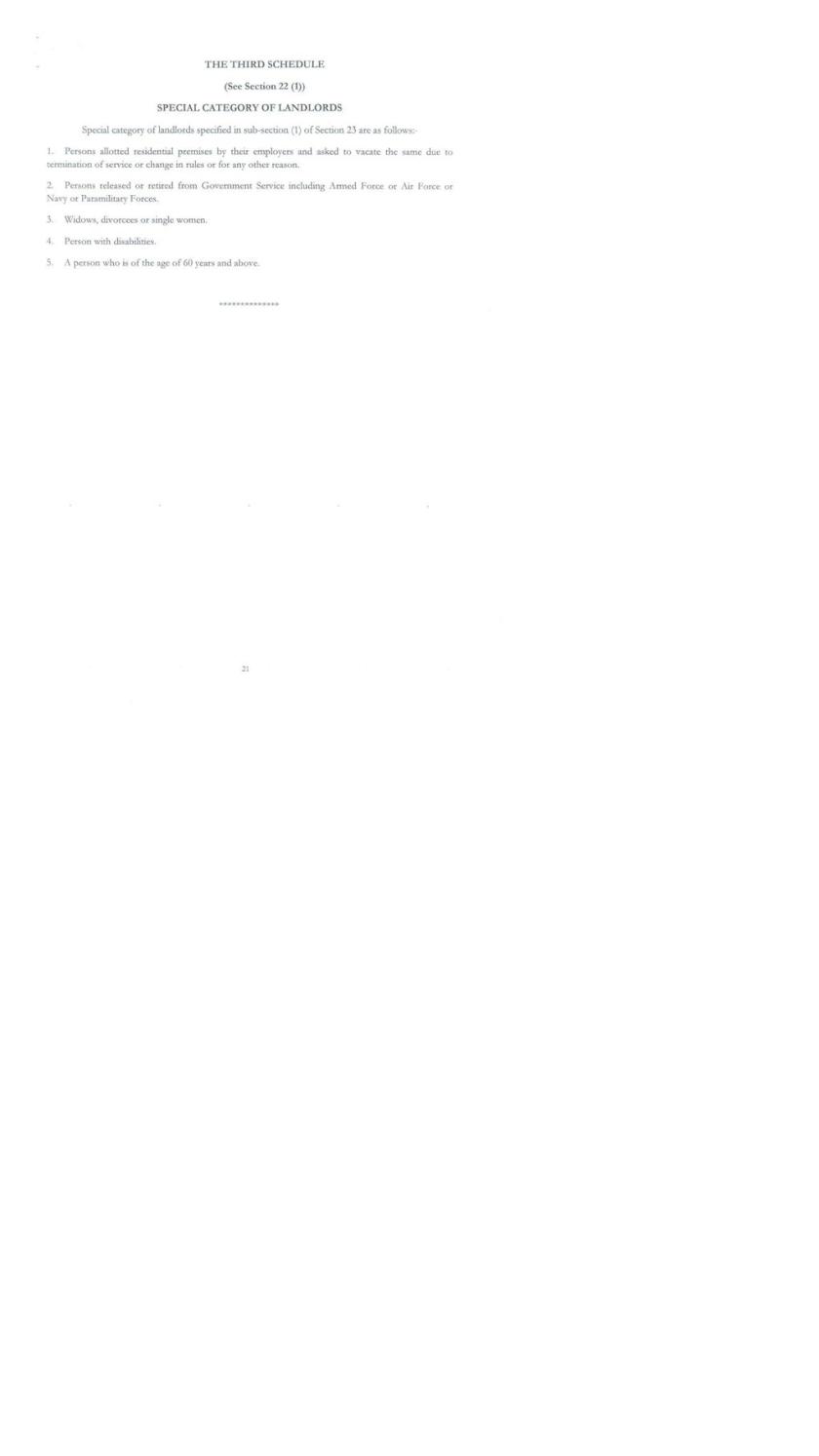A BILL to regulate the leasing of buildings to control the rent and protect the rights of the landlords and tenants of such buildings in the State of Kerala.
Be it enacted in the Fifty-nineth year of the Republic of India, as follows.—
- Short title, extent and commencement.—(1) This Act may be called The Kerala Buildings AND Apartments (Lease, Fair Rent and other Facilities) Act ___
(2) It extends to the whole of the State of Kerala
(3) It shall come into force at once.
- Definitions. —In this Act, unless the context otherwise requires.—
(1) “Building” means any building, flat or hut or part of a building or hut, let or to be let separately for residential or non-residential purposes and includes
(a) The premises, gardens, grounds, wells, tanks and structures, if any, appurtenant to such building, hut, or part of such building or hut, and let and to be let along with such building, flat or hut.
(b) Any furniture supplied by the landlord for use in such building, flat or hut and part of a building, flat or hut.
(c) Any fittings or machinery belonging to the landlord, affixed to or installed in such building, flat or part of such building or flat and intended to be used by the tenant for or in connection with the purpose for which such building or part of such building is let or to be let, but does not include a room in a hotel or boarding house.
(2) “Inspector” means any person appointed to perform the functions of inspector under the Act.
(3) “Landlord” means a person who, for the time being is receiving, or is entitled to receive the rent of any premises, whether on his own account or on account or on behalf of, or for the benefit of, any other person or as a trustee, guardian or receiver for any other person or who would so receive the rent or be entitled to receive the rent, if the premises were let to a tenant.
(4) “Prescribed” means prescribed by rules made under this Act.
(5) “Rent Control Court” means the court constituted under section 32.
(6) “Standard rent: in relation to any premises means the rent fixed by the Rent Control Court under the provisions of the Act.
(7) “Tenant” means any person by whom or on whose account or behalf the rent of any premises is or, but for a special contract, would be payable and payable, and includes
(i) The heir or heirs of a deceased tenant and
(ii) Any person continuing in possession after the termination of his tenancy.
- Landlord and tenant to furnish particulars.—(1) Every landlord and every tenant of a building shall be bound to furnish a statement in writing signed by both the landlord and tenant to the executive Authority of a Municipal Council or Township Committee or Panchayat or the Revenue Officer of a corporation or any other officer duly authorized in this behalf containing the details of tenancy arrangement in respect of the building within 15 days of the commencement of the tenancy arrangement in respect of that building along with a filing fee of Rs.5/-.
(2) If one of the party alone signs and files the statement he or she shall forward a copy of the statement proposed to be filed before the filing Authority to the other party by Registered post acknowledgement due before filing the same.
(3) On receiving the statement the office who receives the same shall enter the details of the tenancy in a Register maintained for that purpose noting the names of the landlord and tenant and the terms and conditions of the tenancy and the date on which it was filed.
- Inheritability to tenancy—(1) In the event of death of a tenant, the right of tenancy shall devolve from the date of his death to his successors in the following order, namely,
(a) Spouse,
(b) Son or daughter or where there are son/sons and daughter/daughters on all of them.
(c) Parents
(d) Daughter-in-law, being the widow of his pre-deceased son.
Provided that the successor has ordinarily been living in the premises with the deceased tenant as a member of his family upto the date of his death and was wholly dependent on the deceased tenant
(2)If a person, being a successor mentioned in sub section (1), was ordinarily living in the premises with the deceased tenant but was not dependent on him on the date of his death, or he or his spouse or any of his dependent son or daughter is owning or occupying a residential premises in the locality, such successor shall acquire a right to continue in possession as a tenant for a limited period of one year from the date of death of the tenant, and, on the expiry of that period, or on his death, whichever is earlier, the right of such successor to continue in possession of the premises shall become extinguished.
Explanation.—For the removal of doubts, it is hereby declared that (a), where, by reason of sub-section(2) the right of any successor to continue in possession of the premises becomes extinguished, such extinguishment shall not affect the right of any other successor of the same category to continue in possession of the premises but if there is no other successor of same category, the right to continue in possession of premises shall not, on such extinguishments, pass on to any other successor specified in any lower category or categories, as the case may be.
(b) the right of every successor, referred to in sub-section(1) to continue in possession of the premises as a tenant shall be strictly personal to him and shall not, on the death of such successor, devolve on any of his heirs.
(3) Nothing in sub-section (1) or sub-section(2) shall apply to a non-residential premises and vacant possession of such premises shall be delivered to the landlord within one year
(i) Of the death of tenant
(ii) Of the dissolution of the firm, in case the tenant is a firm
(iii) Of the winding up of the company, in case the tenant is a company
(iv) Of the dissolution of the corporate body other than a company, in case the tenant is such a corporate body.
5.Rent Payable.—The rent payable in relation to a premises shall be (a) The rent agreed to between the landlord and the tenant or
(b) The standard rent fixed by the Rent Control Court as per section 9.
Provided that the rent payable may be increased by 10 percent in every three years; if the tenant wants to continue after the expiry of the 3 year period.
(c) The provision in the proviso to clause (b) would apply to standard rent fixed by the court as per Section 9.
6.Other Charges Payable.—(1) A tenant shall pay to the landlord, besides the rent, the following charges, namely (a) charges not exceeding fifteen percent of the rent for the amenities as agreed to between the landlord and the tenant.
(b) Maintenance charges at the rate of ten percent of the rent.
(2) The landlord shall be unless otherwise agreed entitled to recover from the tenant the amount paid by him towards charges for electricity or water consumed or to the charges levied by a local or other Authority which is ordinarily payable by the tenant.
- Revision of rent in certain cases.—(1) Where a landlord has at any time, before the commencement of this Act with or without the approval of the tenant or after the commencement of this Act with the written approval of the tenant incurred expenditure for any improvement, addition or structural alteration in the premises, not being expenditure on decoration or tenantable repairs necessary or usual for such premises, and the cost of that improvement, addition or alteration has not been taken into account in determining the rent of the premises, the landlord may lawfully increase the rent per year by an amount not exceeding ten per cent of such cost.
(2) Whether, after the rent of a premises has been fixed under this Act, or agreed upon as the case may be, there has been a decrease, diminution or deterioration of accommodation in such premises, the tenant may claim a reduction in the rent.
- Notice of increase of rent. – (1) Where a landlord wishes to increase the rent of any premises (under sub section (1) of section (7) he shall give the tenant a notice of his intention to make the increase and in so far as such increase is lawful under this Act, it shall be due and recoverable only in respect of the period of the tenancy after the expiry of thirty days from the date on which the notice is given.
(2) Every notice under sub-section (1) shall be in writing signed by or on behalf of the landlord and given in the manner provided in section 106 of the Transfer of Property Act, 1982 (4 of 1882).
- Rent Control Court to fix standard rent, etc.—(1) The Rent Control Court shall on an application made to it in this behalf, in the prescribed manner, fix in respect of any building;
(i) The standard rent for such building after holding such enquiry as it thinks fit taking into consideration all evidentiary materials produced by both parties and also the report of the valuer. The report of the valuer shall contain the details of all the facts taken note of by the valuer while inspecting the building and his reasons for his conclusion regarding the reasonable amount of rent the building may fetch on the date of his visit. Such report can only be considered as one piece of evidence and not a conclusive one.
(ii) The other charges payable as per section 6.
- The revision in rent as per the provisions of section 7.
(2) In fixing the standard rent of any premises part of which has been lawfully sub-let, the Rent Control Court may also fix the standard rent of such part sub-let.
(3) The standard rent shall in all cases be fixed for a tenancy of twelve months.
Provided that where any premises are let or re-let for a period of less than twelve months, the standard rent for such tenancy shall bear the same proportion to the annual rent as the period of tenancy bears to twelve months.
(4) In fixing the standard rent of any premises under this section, the Rent Control Court shall fix the standard rent thereof in an unfurnished state and may also determine an additional charge to be payable on account of any fittings or furniture supplied by the landlord and it shall be lawful for the landlord to recover such additional charge from the tenant.
(5) In fixing the standard rent or lawful increase or decrease of rent or determining the other charges payable in respect of any premises under this section., the Rent Control Court shall specify a date from which the standard rent so fixed shall be deemed to have effect.
(6) The Rent Control Court may, while fixing standard rent or lawful increase or decrease in rent or other charges payable, order for payment of the arrears of amount due by the tenant to the landlord in such number of installments within a time to be fixed by the Court.
- Fixation of interim rent.—If an application for fixing the standard rent or for determining the lawful increase of such rent is made under section 9, the Rent Control Court shall, as expeditiously as possible, make an order specifying the amount of the rent or the lawful increase to be paid by the tenant to the landlord pending final decision on the application and shall appoint the date from which the rent or lawful increase so specified shall be deemed to have effect.
- Receipt to be given for rent paid.–(1) Every tenant shall pay rent and other charges payable within the time fixed by contract or in the absence of such stipulation, by the fifteenth day of the month next following the month for which it is payable and where any default occurs in the payment of rent or other charges, the tenant shall be liable to pay simple interest at the rate of fifteen per cent per annum from the date on which such payment of rent and other charges payable is due to the date on which it is paid.
(2) Every tenant who makes payment of rent or other charges payable or advance towards such rent or other charges to his landlord shall be entitled to obtain forthwith from the landlord or his authorized agent a written receipt for the amount paid to him, signed by the landlord or his authorized agent.
Provided that it shall be open to the tenant to remit the rent to his landlord by postal money order.
(3) If the landlord or his authorized agent refuses or neglects to deliver to the tenants the receipt referred to in sub section (2), the Rent Control Court may, on an application made to him in this behalf by the tenant within two months from the date of payment and after hearing the landlord or his authorized agent, by order direct the landlord or his authorized agent to pay to the tenant, by way of damages, such sum not exceeding double the amount of rent or other charges paid by the tenant and the costs of the application and shall also grant a certificate to the tenant in respect of the rent or other charges paid.
(4) If the landlord or his authorised agent refuses to accept or evades acceptance or receipt of rent and other charges payable to him the tenant may, by notice in writing, ask the landlord to supply him the particulars of his bank account in a bank located in the locality into which the tenant nay deposit the rent and other charges payable to the credit of the landlord.
(5) If the landlord supplies the particulars of his bank account, the tenant shall deposit the rent and other charges payable in such bank account from time to time.
(6) If the landlord does not supply the particulars of bank account under sub section (4), the tenant shall remit the rent and the other charges payable to the landlord from time to time though postal money order after deducting the postal charges.
- Deposit of rent by the tenant. – (1) Where the landlord does not accept any rent tendered by the tenant within the time referred to in section 11 of refuses or neglects to deliver a receipt referred to therein or where there is a bona fide doubt as to the person or persons to whom the rent is payable, the tenant may deposit such rent with the Rent Control Court in the prescribed manner:
Provided that in case where there is a bona fide doubt as to the person or persons to whom the rent is payable, the tenant may remit such rent to the Rent Control Court by postal money order.
(2) The deposit shall be accompanied by an application by the tenant containing the following particulars, namely :- (a) The premises for which the rent and other charges payable are deposited with a description sufficient for identifying the premises
(b) The period for which the rent and other charges payable are deposited,
(c) The name and address of the landlord or the person or persons claiming to be entitled to such rent and other charges payable.
(d) The reasons and circumstances for which the application for depositing the rent and other charges payable is made.
(e) Such other particulars as may be prescribed.
(3) On deposit of the rent and other charges payable being made, the Rent Control Court shall send in the prescribed manner a copy of the application to the landlord or the persons claiming to be entitled to the rent and other charges payable with an endorsement of the date of the deposit.
(4) If an application is made for the withdrawal of any deposit of rent and other charges payable the Rent Control Court shall, if satisfied that the applicant is the person entitled to receive the rent and other charges deposited, order the amount of the rent and other charges to be paid to him in the manner prescribed.
Provided that no order for payment of any deposit of rent and other charges payable shall be made by the Rent Control Court under this sub section without giving al the persons named by the tenant in his application under sub section (2) as claiming to be entitled to payment of such rent and other charges payable an opportunity of being heard and such order shall be without prejudice to the rights of such persons to receive such rent and other charges payable being decided by a court of competent jurisdiction.
(5) If at the time of filing the application under sub section (4) but not after the expiry of thirty days from receiving the notice of deposit, the landlord or the person or persons claiming to be entitled to the rent and other charges payable complains or complain to the Rent Control Court that the statements in the tenant’s application of the reasons and circumstances which led him to deposit the rent and other charges payable are untrue, the Rent Control Court after giving the tenant an opportunity of being heard, may levy on the tenant a fine which may extend to an amount equal to two month’s rent, if the Rent Control Court is satisfied that the said statements were materially untrue and shall order that a sum may order that a sum out of the fine realized be paid to the landlord as compensation over and above the arrears of rent and charges deposited.
(6) The Rent Control Court may, on the complaint of the tenant and after giving an opportunity to the landlord of being heard, levy on the landlord a fine which may extend to an amount equal to two months, rent, if the Rent Control Court is satisfied that the landlord, without any reasonable cause, refused to accept rent and other charges payable though tendered to him within the time referred to in section 15 and may further order that a sum of the fine realized be paid to the tenant as compensation.
- Time limit of making deposit and consequences of incorrect particulars in application for deposit.—(1) No rent deposited under section 12 shall be considered to have been validly deposited under that section, unless the deposit is made within twenty-one days of the time referred to in section 11 for payment of the rent.
(2) No such deposit shall be considered to have been validly made, if the tenant willfully makes any false statement in his application for depositing the rent, unless the landlord has withdrawn the amount deposited before the date of filing an application for the recovery of possession of the premises from the tenant.
(3) If the rent is deposited within the time mentioned in sub-section (1) and does not cease to be valid deposit for the reason mentioned in sub-section (2), the deposit shall constitute payment of rent to the landlord, as if the amount deposited had been validly tendered.
- Saving as to acceptance of rent and other charges payable and forfeiture thereof in deposit.—(1) The withdrawal of rent and other charges payable deposited under section 12 in the manner provided therein shall not operate as an admission against the person withdrawing it of the correctness of the rate of rent and other charges payable during the period of default, the amount due, or of any other facts stated in the tenants application for depositing the rent and other charges payable under the said section.
(2) Any rent and other charges payable and deposited which are not withdrawn by the landlord or by the person or persons entitled to receive such rent and other charges payable shall be forfeited to Government by an order made by the Rent Control Court, if they are not withdrawn before the expiration of five years from the date of posting of the notice or deposit.
(3) Before passing an order of forfeiture, the Rent Control Court shall give notice to the landlord or the person or persons entitled to receive the rent and other charges in deposit by registered post at the last known address of such landlord or person or persons and shall also publish the notice in his office and in any local newspaper.
- Duties of landlord.—(1) Subject to any contract in writing to the contrary, every landlord shall be bound to keep the premises in good and tenantable repairs.
Explanation:— ‘Good and tenantable repairs’ under this section and section 16 shall mean such repairs as shall keep the premises in the same condition in which it was let out except for the normal wear and tear.
(2) Where any repairs without which the premises are not habitable or usable except with inconvenience are to be made and if the landlord neglects or fails to make them within a period of three months after notice in writing, the tenant may apply to the Rent Control Court for permission to make such repairs himself and may submit to the Rent Control Court an estimate of the cost of such repairs, and , thereupon, the Rent Control Court may after giving the landlord an opportunity of being heard and after considering such estimate of the cost and making such inquiries as it may consider necessary, by an order in writing, permit the tenant to make such repairs at such cost as may be specified in the order and it shall thereafter be lawful for the tenant to make such repairs himself and to deduct the cost thereof which shall in no case exceed the amount so specified, from the rent or otherwise recover it from the landlord;
Provided that the amount so deducted or recoverable from rent in any year shall not exceed one- half of the rent payable by the tenant for that year and any amount remaining not recovered in that year shall be deducted or recovered from rent in the subsequent years at the rate of not more than twenty- five per cent of the rent for a month:
Provided further that where there are more than one premises owned by a landlord in a building, the tenants thereof may jointly carry out the repairs and share the expenses proportionately.
(3) Nothing in sub-section (2) shall apply to a premises which- (a) At the time of letting out was not habitable or usable except with undue inconvenience and the tenant had agreed to take the same in that condition,
(b) After being let out was caused to be not habitable or usable except with undue inconvenience by the tenant.
(4) It shall be the duty of every landlord of a building let out to send a communication by registered post with acknowledgement due card to the nearest Police Station within whose jurisdiction the said building is situated furnishing the full name, age, fathers’ name, the address of the his employment, date of commencement of tenancy, the monthly rent, along with a photostat copy of the identify proof of the tenant.
(5).The said communication should be forwarded within one month from the date of commencement of the tenancy.
Explanation—The identify proof means any document such as Ration Card, Income Tax Pan Card, Driving Licence, Employment Identity Card in case of Government Employees.
(6) Each police station shall keep a register of the buildings which are occupied by tenants in their area.
(7)Any landlord who refuses to furnish such information shall be liable for punishment which may extend to fine up to ten thousand rupees in the first instance and on subsequent instances the punishment shall be simple imprisonment up to three months or with a minimum fine of ten thousand rupees.
- Duties of tenant.—(1) Every tenant shall be bound to keep the premises in good and tenantable repairs.
(2) The landlord or a person authorised by him shall have the right to enter and inspect the premises after notice to the tenant in the manner prescribed.
(3) The tenant shall make good all damages caused to the premise by his negligence within three months of being informed in writing to do so by the landlord failing which the landlord may apply to the Rent Control Court for permission to make good the said damages and the Rent Control Court shall decide the matter in the manner after giving the tenant an opportunity of being heard and after considering such estimate of the cost and making such inquiries as he may consider necessary, by an order in writing, permit the landlord to make such repairs at such cost as may be specified in the order, and it shall thereafter be lawful for the landlord to make such repairs and to recover the cost of such repairs, which shall in no case exceed the amount so specified, from the tenant.
(4) The tenant shall hand over the possession of the premises on determination of tenancy in the same condition, except for the normal wear and tear, as it was in when it was handed over to him at the beginning of such tenancy and in a case where certain damages have been caused, not being damages caused by force majeur, the tenant shall make good the damages caused to the premises failing which the landlord may apply to the Rent Control Court and the Rent Control Court shall decide the matter in the manner provided in sub- section (3).
(5) The tenant shall not, whether during the subsistence of tenancy or thereafter, demolish any improvement or alteration other than any fixture of a removable nature, without the permission of the landlord failing which such demolition or alteration shall be deemed to be a damage caused by such tenant under sub- section (3) and shall be dealt with accordingly.
- Cutting of or withholding essential supply or service.—(1) No landlord either himself or through any person purporting to act on his behalf shall without just and sufficient cause cut off or withhold any essential supply or service enjoyed by the tenant in respect of the premises let to him.
(2) If a landlord contravenes the provisions of sub-section (1) the tenant may make an application to the Rent Control Court complaining of such contravention.
(3) If the Rent Control Court is satisfied that the essential supply or service was cut off or withheld by the landlord with a view to compel the tenant to vacate the premises or to pay an enhanced rent, the Rent Control Court may pass an order directing the landlord to restore the amenities immediately, pending enquiry referred to in sub-section (4).
Explanation: – An interim order may be passed under the sub-section without giving notice to the landlord.
(4) If the Rent Control Court in inquiry finds that the essential supply or service enjoyed by the tenant in respect of the premises was cut off or withheld by the landlord without just and sufficient cause, he shall make an order directing the landlord to restore such supply or service.
(5) The Rent Control Court may in its discretion direct compensation not exceeding one thousand rupees
(a) Be paid to the landlord by the tenant, if the application under sub-section (2) was made frivolously or vexatiously.
(b) Be paid to the tenant by the landlord, if the landlord has cut off or withheld the supply or service without just and sufficient cause.
Explanation-1. In this section, “essential supply or service” includes supply of water, electricity, lights in passage and on staircases, conservancy and sanitary service.
Explanation-II. For the purpose of this section, withholding any essential supply or service shall include acts or omissions, attributable to the landlord on account if which the essential supply or service is cut off by the local Authority or any other competent Authority.
18.Protection of tenants against eviction.—(1) Notwithstanding anything to the contrary contained in any other law or contract, no order or decree for the recovery of possession of any premises shall be made by the Rent Control Court in favour of the landlord against a tenant, save as provided of this Act.
(2) The Rent Control Court on an application made to it in the prescribed manner, make an order for the recovery of possession of the premises on one or more of the following grounds only, namely:-
(a) that the tenant has neither paid nor tendered the whole of the arrears of rent and other charges legally recoverable from him within two months from the date on which a notice of demand for payment of such amount has been served on him by the landlord in the manner provided in section 106 of the Transport of Property Act, 1882 (Act 4 of 1882).
(b) That the tenant has without the consent in writing of the landlord sub-let, assigned or otherwise parted with the possession of the whole or any part of the premises.
(c) That the tenant has used the premises for a purpose other than that for which they were let without obtaining consent in writing of the landlord.
(d) That the premises were let for use as a residential or commercial one and the tenant has not been occupying therein, without a reasonable cause for a period of one year, immediately before the date of the filing of the application for the recovery of possession thereof;
(e) That the premises or any part thereof have become unsafe or unfit for human habitation.
(f) The landlords requires the premises for carrying out repairs or reconstruction which cannot be carried out without the premises being vacated.
Provided that no order for the recovery of possession under this clause, clause (g), clause (h) or clause (I) shall be made unless the Rent Control Court is satisfied that the plans and estimates of such repairs or re-construction, as the case may be, have been properly prepared and the landlord has the necessary means to carry out the said repairs or re-construction :
(g) That the premises or any part thereof are required by the landlord for the purpose of immediate demolition ordered by the Government or any local Authority or the premises are required by the landlord to carry out any building work at the instance of the Government or a local Authority in pursuance of any improvement scheme or development scheme and that such building work cannot be carried out without the premises being vacated.
(h) That the premises or any part thereof are required by the landlord for carrying out any repairs which cannot be carried out without the premises being vacated,
(i) That the premises are required by the landlord for the purpose of building or re building or make thereto any substantial addition or alteration including construction on the terrace or on the appurtenant land and that such building or re-building or addition or alteration cannot be carried out without the premises being vacated.
(j) That the premises consist of not more than two floors and the same are required by the landlord for the purpose of immediate demolition with a view to re-build the same.
Provided that where the building for which such premises or premises possession in respect of which has been recovered under clause (e), clause (f), clause (g) or clause (h) a tenant so dispossessed shall have a right of first option to get the reconstructed building or such portion of the reconstructed building equivalent in area to the original premises in which he was a tenant on new terms either agreed by the parties or fixed by the court after reconstruction in appropriate proceedings.
(k) That the tenant, his spouse or a dependent son or daughter ordinarily living with him has, whether before or after the commencement of this Act, built or acquired vacant possession of, or been allotted a residence,
Provided that the Rent Control Court may in appropriate cases allow the tenant to vacate the premises within such period as he may permit but not exceeding one year from the date of passing of orders of eviction,
(l) That the premises were let to the tenant for use as a residence by reason of his being in the service of employment of the landlord, and that the tenant has ceased, whether before or after the commencement of this Act, to be in such service or employment.
Provided that no order for the recovery of possession of any premises shall be made on this ground if the Rent Control Court is of the opinion that there is any bona fide dispute as to whether the tenant has ceased to be in the service or employment of the landlord.
(m) That the tenant has, whether before or after the commencement of this Act, caused or permitted to be caused substantial damages to or such alteration of the premises as has the effect of changing its identity or diminishing its value substantially.
(n) That the tenant or any person residing with the tenant has been convicted of causing nuisance or annoyance to a person living in the neighborhood of the premises or has been convicted of using or allowing the use of the premises for an immoral or illegal purpose,
(o) That the tenant has, notwithstanding previous notice, used or dealt with the premises in a manner contrary to any condition imposed on the landlord by the Government or the local Authority or the Municipal Corporation while giving him a lease of the land on which the premises are situate,
Provided that no order for the recovery of possession of any premises shall be made on this ground if the tenant, within such time as may be specified in this behalf by the Rent Control Court, complies with the condition imposed on the landlord by any of the authorities referred to in this clause or pays to the authority imposing such conditions the amount by way of compensation as the Rent Control Court may direct.
(p) That the tenant in his reply having denied the ownership of landlord, has failed to prove it or that such denial was not made in a bona fide manner.
(q) That the person in occupation of the premises has failed to prove that he is a bona fide tenant.
(r) That the premises let for residential or non residential purpose are required, whether in the same form or after re-construction or re-building, by the landlord for occupation for residential or non-residential purpose for himself or for any member of his family if he is the owner thereof, or for any person for whose benefit the premises are held and that the landlord or such person has no other reasonably suitable accommodation.
Provided that where the landlord has acquired the premises by transfer, no application for the recovery of possession of such premises shall lie under this clause unless a period of one year has elapsed from the date of the acquisition;
Explanation I.—Premises let for a particular use may be required by the landlord for a different use if such use is permissible under law.
Explanation II.- For the purpose of this clause or section 19, section 20, section 21 or section 22, an occupation by the landlord of any part of a building of which any premises let out by him forms a part shall not disentitle him to recovery the possession of such premises.
(3) In any proceeding for eviction under clause (f), (g), (h), (i)or of sub section (2) or section 20 or section 21 or section 22, the Rent Control Court may allow eviction from only a part of the premises if the landlord is agreeable to the same.
Provided that, in case of such part eviction, the rent and other charges payable by the tenant will be decreased in proportion to the part vacated.
- Restriction against eviction not applicable to certain tenants:-Nothing contained in section 18 shall be applicable to a tenant of a residential building if the monthly rent is above Rs. 10,000/- and a tenant of a commercial building if the rent is above Rs.15, 000/- per month. Eviction in such cases shall be governed strictly by the provisions of the agreement on the basis of which the building was let out and other provisions of land especially transfer of property act.
- Right to recover immediate possession of premises to accrue to certain persons.- (1) Where a person in occupation of any residential premises allotted to him by the Government or any local authority is required by, or in pursuance of, any general or special order made by that Government or authority to vacate such residential accommodation there shall accrue, on and from the date of such order, to such person, notwithstanding anything contained elsewhere in this Act or in any other law for the time being in force or in any contract (whether express or implied), custom or usage to the contrary, a right to recover immediate possession of any premises let out by him, his spouse or his dependent son or daughter, as the case may be,
Explanation .- For the purpose of this sub-section, section 20, 21 and 22, immediate possession shall mean possession recoverable on the expiry of sixty days from the date of order of eviction.
(2) Where a landlord exercises the right of recovery conferred on him by sub section (1) or section 18, 21 or 22 and he had received.- (a) Any rent in advance from the tenant, he shall refund to the tenant such amount as represents the rent payable for the unexpired portion of the contract, agreement or lease by depositing the same before the tribunal either on the date on which the delivery is ordered to be effected or two weeks prior to the date fixed for delivery of possession.
(b) Any other payment, he shall, in a like manner refund to the tenant a sum which shall bear the same proportion to the total amount so received, as the unexpired portion of the contract agreement or lease bears to the total period of contract, agreement or lease,
Provided that, if any default is made in making any refund as aforesaid, the landlord shall be liable to pay simple interest at the rate of fifteen per cent, per annum on the amount which he has omitted or failed to refund.
Provided further that it shall be permissible for the landlord to set off any amount which he is lawfully entitled to recover from the tenant against the refund due to the tenant.
- Right to recover immediate possession of premises to accrue to members of the armed forces, etc.– (1) Where a person- (a) Is a released or retired person from any armed forces and the premises let out by him, his spouse or his dependent son or daughter, as the case may be, are required for his own residence, or
(b) Is a dependent of a member of any armed forces who has been killed in action and the premises let out by such members are required for the residence of the family of such member.
Such person, his spouse or his dependent son or daughter, as the case may be, may, within one year from the date of his release or retirement from such armed forces or, as the case may be, the date of death such member, or within a period of one year from the date of commencement of this Act, whichever is later, apply to the Rent Control Court for recovery of immediate possession of such premises.
(2) Where a person is a member of any of the armed forced and has a period of less than one year preceding that date of his retirement and the premises let out by him, his spouse or his dependent son or daughter, as the case may be, are required for his own residence after his retirement, he, his spouse or his dependent son or daughter, as the case may be, may, at any time, within a period of one year before the date of his retirement, apply to the Rent Control Court for recovery of immediate possession of such premises.
(3) Where the person, his spouse or his dependent son or daughter refereed to in sub section (1) or sub section (2) has let out more than one premises it shall be open to him, his spouse or his dependent son or daughter, as the case may be, to make an application under the sub section in respect of only one of the premises chosen.
Explanation: – For the purposes of this section “armed forces” means an armed force of the Union constituted under an Act of Parliament and includes a member of the police force in the State.
- Right to recover immediate possession of premises to accrue to Central Government and State Government employees. – (1) Where a person is a retired employee of the Central Government or of a State Government and the premises let out by his, his spouse or his dependent son or daughter are required for his own residence such employee, his spouse or his dependent son or daughter, as the case may be, within one year from the date of his retirement or within a period of one year from the date of commencement of this Act, whichever is later, apply to the Rent Control Court for recovery of immediate possession of such premises.
(2) Where a person is an employee of the Central Government of a State Government and has a period of less than one year preceding the date of his retirement and the premises let out by him or his spouse or dependent son or daughter are required by him for his own residence after his retirement, he, his spouse or his dependant son or daughter as the case may be, may, at any time within a period of one year before the date of retirement apply to the Rent Control Court for recovery of immediate possession of such premises.
(3) Where the person, his spouse or his dependent son or daughter referred to in sub-section (1) or in sub-section (2) has let out more than one premises, it shall be open to him to exercise the right under the sub-section in respect of only one of the premises chosen by him.
- Right to recover immediate possession of premises to accrue to widows, handicapped persons and old persons.- (1) Where the landlord is- (a) A widow and premises let out by her, or by her husband.
(b) A handicapped person and the premises let out by him.
(c) A person who is of the age of sixty-five years or more and the premises let out by him, is required by her or him or for her or his family or for any one ordinarily living with her or him for residential or no –residential use, she or he may apply to the Rent Control Court for recovery of immediate possession of such premises.
(2) Where the landlord referred to in such section (1) has let out more than one premises, it shall be open to him to make an application under that sub section in respect of any one residential and one non-residential premises each chosen by him.
Explanation 1.- For the purpose of this section, “handicapped person” shall mean a person who if he is an assessee under the Income Tax Act, 1961(43 of 1961) entitled for the time being to the benefit of deduction under section 80U of that Act.
Explanation II.- The right to recover possession under this section shall be exercisable only once in respect of residential and non-residential buildings.
- Payment of rent during eviction proceedings.- (1) If, in any proceeding for the recovery of possession of any premises on any ground the tenant contests the claim for eviction, the landlord may, at any stage of the proceeding, make an application to the Rent Control Court for an order on the tenant to pay to the landlord the amount of rent legally recoverable from the tenant and the Rent Control Court may, after giving the parties an opportunity of being heard, make an order directing the tenant to pay to the landlord or deposit with the Rent Control Court within one month of the date of the order, an amount calculated at the rate of rent at which it was last paid for the period of which the arrears of the rent were legally recoverable from the tenant including the period subsequent thereto up to the end of the month previous to that in which payment or deposit is made and to continue to pay or deposit, month by month, by the fifteenth of each succeeding month, a sum equivalent to the rent at that rate.
(2) If, in any proceeding referred to in sub section (1), there is any dispute as to the amount of rent payable by the tenant, the Rent Control Court shall, within fifteen days of the date of the first hearing of the proceeding, fix an interim rent in relation to the premises to be paid or deposited in accordance with the provisions of sub section (1) until the rent in relation there is determined having regard to the provisions of this Act, and the amount of arrears, if any, calculated on the basis of the rent so determined shall be paid or deposited by the tenant within one month of the date on which the standard rent is fixed or such further time as the Rent Control Court may allow in this behalf.
(3) If, in any proceeding referred to in sub section (1), there is any dispute as to the person or persons to whom the rent is payable, the Rent Control Court may direct the tenant to deposit with the Rent Control Court the amount payable by him under sub section (1) or sub section (2), as the case may be , and in such a case, no person shall be entitled to withdraw the amount in deposit until the Rent Control Court decides the dispute and makes an order for payment of the same.
(4) If the Rent Control Court is satisfied that any dispute referred to in sub section (3) has been raised by a tenant for reason which are false or frivolous, the Rent Authority may order the defence against eviction to be struck out and proceed with the hearing of the application.
(5) If a tenant fails to make payment or deposit as required by this section, the Rent Control Court may order the defence against eviction to be struck out and proceed with the hearing of the application.
- Recovery of possession for occupation and re-entry.- (1) Where a landlord recovers possession of any premises form the tenant in pursuance of an order made under clause (q) of sub section (2) of section 18or under section 21,22 or 23the landlord shall not, except with the permission of the Rent Control Court obtained in the prescribed manner, re-let the whole or any part of the premises within three years from the date of obtaining such possession, and in granting such permission, the Rent Control Court may direct the landlord to put such evicted tenant in possession of the premises.
Provided that where a landlord recovers possession of any premises from the tenant in pursuance of an order made under clause (q of sub section (2) of section 18 for occupation after construction or rebuilding, the period of three years shall be reckoned form the date of completion of reconstruction or rebuilding , as the case may be.
(2) Where the landlord recovers possession of any premises as aforesaid and the premises are not occupied by the landlord or by the person for whose benefit the premises are held, within two months of obtaining such possession, or the premises having been so occupied are, at any time within three years from the date of obtaining possession, re-let to any person other than evicted tenant without obtaining the permission of the Rent Control Court under sub section (1) or the possession of such premises is transferred to another person for reasons which do not appear to the Rent Control Court to be bona fide, the Rent Control Court may, on any prescribed, direct the landlord to put the tenant in possession of the premises on the same term and conditions of the premises are in the same form or on new terms and conditions if the premises have been re-constructed or re-built if he has not already built, acquired vacant possession of, or been allotted another premises or to pay him such compensation as the Rent Control Court thinks fir or both, as the facts and circumstances of the case may warrant.
- 26. Recovery of possession for repairs and re-building and re-entry.- (1) In making any order on the grounds specified in clause (e), (f), (g), (h), or (I) or sub section (2) of section 18 the Rent Control Court shall fix the new rent and ascertain from the tenant whether he elects to be placed in occupation of the premises or part thereof from which he is to be evicted and if the tenant so elects, shall record the fact of the election in the order and specify therein the date n or before which he shall deliver possession so as to enable the landlord to commencement the work of repairs or building or re-building, as the case may be and the date before which the landlord shall deliver the possession of the said premises.
(2) If the tenant delivers possession on or before the date specified in the order, the landlord shall, on the completion of the work of repairs or building or re-building, place the tenant in occupation of the premises or part thereof before the date specified in sub section (1) or such extended date as may be specified by the Rent Control Court by an order.
(3) If after the tenant has delivered possession on or before the date specified in the order, the landlord fails to commence the work of repairs or building or re-building within three months of the specified date the Rent Control Court may, on an application made to him, in this behalf by the tenant, within such times as may be prescribed, order the landlord to place the tenant in occupation of the premises on the same terms and conditions and to pay to the tenant such compensation as the Rent Control Court thinks fit.
(4) If after the tenant has delivered possession on or before the date specified in the order, the landlord fails to commence the work of repairs or building or re-building, as the case may be, in accordance with sub section (2), the Rent Control Court may, on an application made to him in this behalf by the tenant, within such time as may be prescribed , order the landlord to place the tenant in occupation of the premises or revised terms and conditions and to pay to the tenant such compensation as the Rent Control Court thinks fit.
- Recovery of possession in case of tenancies for limited period .- (1) Where a landlord does not require the whole or any part of any premises for a particular period, and after obtaining the permission of the Rent Control Court in the prescribed manner, lets the whole of the premises or part thereof as a residence for such period, not being more than five years, as may be agreed to in writing between the landlord and the tenant and the tenant does not, on the expiry of the said period, vacate such premises, then, notwithstanding anything contained in section 18 or in any other law, the Rent Control Court may, on an application made to him in this behalf by the landlord within such times as may be prescribed, place the landlord in vacant possession of the premises or part thereof by evicting the tenant and every other person who may be in occupation of such premises.
(2) The Rent Control Court shall not- (i) Grant permission under sub-section (1) in relation to a premises consecutively more than two times except for good and sufficient reasons to be recorded in writing.
Explanation.- A permission granted under sub section (1) shall not be construed to be consecutive, if a period of five years or more has elapsed after the expiry of the last limited period tenancy.
(2) Entertain any application from the tenant calling in question the bona fides of the landlord in letting the premises under this section.
(3) All applications made before the Rent Control Court and appeals made before the Appellate Authority by the tenant shall abate on the expiry of period for which permission has been granted under sub-section (1).
(4) While making an order under sub section (1), the Rent Control Court may award to the landlord damages for the use or occupation of the premises at double the last rent paid by the tenant together with interest at the rate of fifteen per cent per annum for the period from the date of such order till the date of actual vacation by the tenant.
- Special provision for recovery of possession in certain cases.- Where the landlord in respect of any premises is any company or other body corporate or any public institution then, notwithstanding anything contained in section 18 or in any other law, the Rent Control Court may, on an application made to it in this behalf by such landlord, place the landlord in vacant possession of such premises by evicting the tenant and every other person who may be in occupation thereof, if the Rent Control Court is satisfied that- (a) The tenant to whom such premises were let for use as a residence at a time when he was in the service or employment of the landlord, has ceased to be in such service or employment and the premises are required for the use of employees of such landlord, or
(b) The tenant has acted in contravention of the terms, express or implied, under which he was authorised to occupy such premises, or
(c) Any other person is in unauthorized occupation of such premises, or
(d) The premises are required bona fide by the landlord for the use of employees of such landlord or, in the case of a public institution, for the furtherance of its activities.
Explanation.- For the purposes of this section, “public institution”, includes any educational institution, library, hospital and charitable dispensary but does not include any such institution set up by a private cost.
- Permission to construct additional structures.- Where the landlord proposes to make any improvement in, or construct any additional structure on, any building which has been let to a tenant and the tenant refuses to allow the landlord to make such improvement or construct such additional structure and the Rent Control Court, on an application made to him in this behalf by the landlord, is satisfied that the landlord is ready and willing to commence the work and that such work will not cause any undue hardship to the tenant, the Rent Control Court may permit the landlord to do such work and may make such other order as he thinks fit in the circumstances of the case.
- Special provision regarding vacant building sites.- Notwithstanding anything contained in section 18, where any premises which have been let comprise vacant land upon which it is permissible under the building regulations or municipal bye-laws, for the time being in force, to erect any building, whether for use a s a residence or for any other purpose and the landlord proposing to erect such building is unable to obtain possession of the land from the tenant by agreement with him and the Rent Control Court, on an application made to him in this behalf by the landlord, is satisfied that the landlord is ready and willing to commence the work and that the severance of the vacant land from the rest of the premises will not cause undue hardship to the tenant, the Rent Control Court may- (a) Direct such severance.
(b) Place the landlord in possession of the vacant land.
(c) Determine the rent payable by the tenant in respect of the rest of the premises, and
(d) Make such other order as he thinks fit in the circumstances of the case.
- Vacant possession to landlord.- Notwithstanding anything contained in any other law, where the interest of a tenant in any premises is determined for any reason whatsoever and any order is made by the Rent Control Court under this Act for the recovery of possession of such premises, the order shall, subject to the provisions of section 30, be binding on all persons who may be in occupation of the premises and vacant possession thereof shall be given to the landlord by evicting all such persons there from.
Provided that nothing in this section shall apply to any person who has an independent title to such premises.
- Constitution of Rent Control Court and appointment of Inspecting Authority and Valuer.—(1) The Government may, by notification in the Gazette, appoint a person who is or is qualified to be appointed a Munsiff to be the Rent Control Court for such local area as may be specified therein.
(2) The Government may, by notification in the Gazette
(a) Appoint such officers as they think fit to be inspectors for the purpose of enforcing the penal provisions of this Act and may assign to them such local limits as they may think fit.
(b) For the purpose of any investigation or enquiry under the Act the inspector may enter any premises with such assistance as he thinks necessary.
(3) The Government may by notification in the Gazette.
(a) Appoint qualified valuers for any area to which this Act applies.
(b) The valuer shall assist the Rent Control Court in fixing the standard rent of any building in respect of which an application for fixation of standard rent is pending before the Rent Control Court.
(c) The valuer shall, having regard to the situation, location and condition of the building, and the amenities provide therein, and where there are similar or nearly similar buildings in the locality, having regard to the rent payable in respect of such building and submit a report to the Rent Control Court indicating in detail the method of calculation of fair rent fixed by him and stating the reasons for its conclusion.
- Execution of orders. — Every order made by the Rent Control Court and every order passed in an appeal shall after the expiry of the time allowed therein, be executed by the Munsiff or if there are more than one Munsiff, by the Principal Munsiff having original jurisdiction over the area in which the building is situated as if it were a decree passed by him.
Provided that an order passed in execution under this section shall not be subject to an appeal but shall be subject to revision by the court to which appeals ordinarily lie against the decision of the said Munsiff.
- Decision which have become final not to be reopened.—The Rent Control Court shall summarily reject any application under section 18 of the Act, which raises between the same parties or between parties under whom they or any of them claim substantially the same issues as have been finally decided in a former proceedings under this Act or under the corresponding provisions of any law in force prior to the commencement of this Act or the corresponding provisions of any law repealed or superceded by such law.
- Appeal.—(1) (a) The Government may, by general or special order notified in the Gazette confer on such officers and authorities not below the rank of a District Judge the powers of appellate authorities for the purpose of this Act in such areas or in such classes of cases as may be specified in the order.
(b) Any person aggrieved by an order passed by the Rent Control Court may, within thirty days from the date of such order, prefer an appeal in writing to the appellate authority having jurisdiction. In computing the thirty days aforesaid, the time taken to obtain a certified copy of the order appealed against shall be excluded.
(2) On such appeal being preferred, the appellate authority may order stay of further proceedings in the matter pending decision on the appeal.
(3) The appellate authority shall send for the records of the case from the Rent Control Court and after giving the parties an opportunity of being heard and, if necessary, after making such further inquiry as it thinks fit either direct or through the Rent Control Court, shall decide the appeal..
Explanation. —The appellate authority may, while confirming the order of eviction passed by the Rent Control Court, grant an extension of time to the tenant for putting the landlord in possession of the building.
(4) The appellate authority shall have all the powers of the Rent Control Court including the fixing of arrears of rent.
(5) The decision of the appellate authority, and subject to such decision, an order of the Rent Control Court shall be final and not be liable to be called in question in any court of law.
- Costs.—Subject to such conditions and limitations, if any, as may be prescribed, the costs of and incidental to all proceedings before the Rent Control Court or the appellate authority referred to in section shall be in the discretion of the Rent Control Court or the appellate authority which shall have full power to determine by whom or out of what property and to what extent such costs are to be paid and to give all necessary directions for the purpose.
Explanation. —The Appellate Authority may set aside or vary any order passed by the Rent Control Court in regard to the costs of and incident to the proceeding before it.
- Power to remand. —In disposing of an appeal under this Act, the appellate authority may remand the case for fresh disposal according to such directions as it may give.
- Order under the Act to be binding on sub-tenant. —Any order for the eviction of a tenant passed under this Act shall be binding on all sub-tenants under such tenant, whether they were parties to the proceedings or not, provided that such order was not obtained by fraud or collusion. In cases where sub-tenancy is allowed under the original agreement of tenancy the sub-tenant shall be made a party to the proceedings if he had given notice of the sub-tenancy to the landlord.
- Proceedings by or against legal representative. —The provisions of section 146 and Order XXII of the Code of Civil Procedure 1908 (5 of 1908), shall, as far as possible, be applicable to the proceedings under this Act.
- Summons etc. —Subject to such conditions and limitations as may be prescribed, the Rent Control Court and the appellate authority shall have the powers which are vested in a court under the Code of Civil Procedure, 1908 (Act 5 of 1908) when trying a suit in respect of the following matter.
- a) Discover and inspect
- b) Enforcing the attendance of witnesses, and requiring the deposits of their expenses
- c) Compelling the production of documents
- d) Examining witnesses on oath
- e) Granting adjournments
- f) Reception of evidence taken on affidavit
- g) Issuing commission for the examination of witnesses and for local inspection.
- h) Setting aside ex parte orders
- i) Enlargement of time originally fixed or granted
- j) Power to amend any defect or error in orders or proceedings; and
- k) Power to review its own order.
- The Rent Control Court or the appellate authority may summon and examine suo moto any person whose evidence appears to it to be material, and it shall be deemed to be a Civil Court within the meaning of section 557 and 561A of the Code of Criminal Procedure, 1973 (Act 2 of 1973).
- Penalties.—(1) If any tenant sub-lets, assigns or otherwise parts with the possession of the whole or part of any premises in contravention of the provisions of clause (b) of sub section (2) of section 18, he shall be punishable with fine which may extend to five thousand rupees, or double the rent received by the tenant for sub-letting for every month till such time the cause of compliant ceases, whichever is more or with imprisonment for a term of one month.
Explanation.- For the purposes of this sub section in case where it is difficult to prove the rent which the landlord or the tenant, as the case may be, is receiving after re-letting or sub-letting, the fine may extend to five thousand rupees.
(2) If, after the tenant has delivered possession, the landlord fails to commence the work of repairs or building or re-building, as the case may be, within three months of the specified date under sub section (3) of section 25, he shall be punishable with fine equivalent to rent for three months or for imprisonment for not more than three months.
(3) If a landlord contravenes the provisions of sub section (2) of section 25, he shall be punishable with fine which may extend to six month’ s rent of the premises.
(4) If a tenant fails to make re-entry under sub section (2) of section 25 within three months from the date of the completion of repairs or rebuilding as the case may be, intimated in writing by the landlord, without reasonable excuse, he shall forfeit his right to re-entry and shall be punishable with fine equivalent to three month’s rent of the premises.
- Time within which proceedings have to be disposed of.—The Rent Control Court or the appellate authority shall, as far as may be practicable pass final orders in any proceedings before it within six months from the date of appearance of the parties thereto.
Exemption.—notwithstanding anything contained in this Act, the Government may, in public interest or for any other sufficient cause, by notification in the Gazette, exempt any building or class of buildings from all or any of the provisions of this Act.
- 43. Power to make rules.—(1) The State Government may, by notification in the official Gazette, make rules for the purpose of carrying out the provisions of this Act.
(2) In particular and without prejudice to the forgoing powers, such rules may provide for all or any of the following matters, namely
(a) The manner of making application under sub-section (1) of section 9.
(b) The manner of depositing or other charges under sub section (5) of section 12.
(c) The particulars under clause (2) of sub-section (2) of section 12.
(d) The manner of sending copy of application to landlord under sub section (3) of Section 12.
(e) The manner in which the rent or other charges to be paid to the applicant under sub-section (5) of section 12.
(f) The manner of giving notice to the tenant under section 18.
(g) The manner in which permission of the Rent Control Court shall be obtained by the landlord under section 28.
(h) The time within which application to be made under sub section (2) of Section 28 of sub section (3) of and sub section (4) of section 29.
(i) The manner in which the permission of the Rent Control Court shall be obtained by the landlord under section 21.
(j) The time within the application shall be made to the Rent Control Court by the landlord under section 26.
(3) Every rule under this Act shall be laid as soon as may be after it is made or issued before the legislative assembly for a total period of fourteen days which may be comprised in one session on in two successive sessions, and if before the expiry of the session to which it is so laid or the session immediately following, the legislative assembly makes any modification in the rule or decided that the rule should not be made or issued, the rule shall thereafter have effect only in such modified form or be of no effect, as the case may be; so however that any such modifications or annulment shall be without prejudice to the validity of anything previously done under that rule.
- Repeal, savings and special provision.—(i) The Kerala Buildings (Lease and Rent Control) Act 1965 (Act 2 of 1965) is hereby repealed.
(ii) Notwithstanding the repeal of the Kerala Buildings (Lease and Rent Control) Act 1965 (Act 2 of 1965) the provisions of section 4 and 23 of the interpretation and General Clause Act 1125 (Act VII of 1125) shall apply upon the repeal of the said Act.
OBJECT AND REASONS
More than 45 years have passed by after the Kerala Buildings (Lease & Rent Control) Act 1965 was brought into force. During this fairly long period circumstances have changed so much that even the High Court in various decisions have pointed out the need to have a re-look at various provisions in the Act especially the provisions regarding fixation of fair rent, conditions on which buildings let out can be evicted. Due to drastic changes in the social set up and the economic conditions in the State several provisions acts harshly on either the landlord or tenant and there is a public demand for a new legislation for and just in the changed set up now existing in the State. It is after taking note of the above facts and circumstances the Commission is recommending a new enactment in the place of the existing Rent Control legislation.
******

